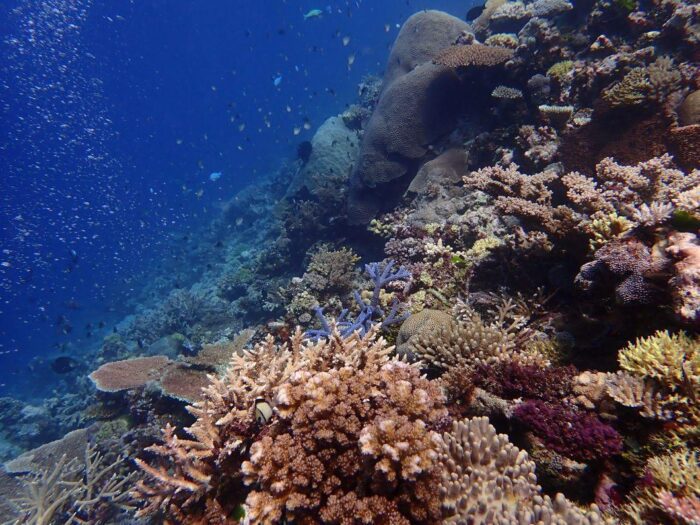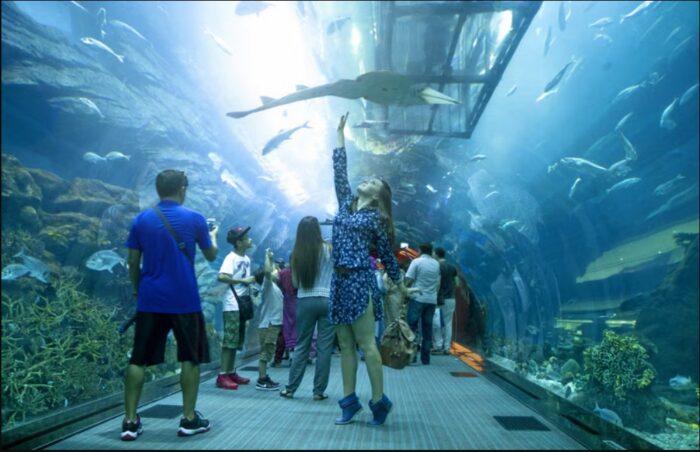Sleeping with the Fishes: The Extraordinary World of Underwater Hotels
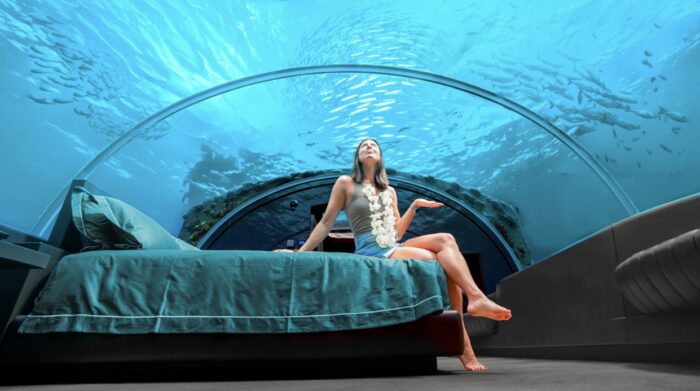
You’re lying in bed, watching a school of tropical fish glide past your window while rays of sunlight filter through the ocean above. This isn’t a dream—it’s the reality of staying in an underwater hotel. These architectural marvels have transformed the ocean floor into luxury destinations where guests can literally immerse themselves in marine life.
The concept sounds like something out of a Jules Verne novel, but underwater hotels are very real and increasingly popular. The Global Underwater Hotels Market is projected to reach approximately USD 12.7 billion by 2033, up from USD 3.8 billion in 2023. That’s a staggering growth rate that reflects our collective fascination with these underwater sanctuaries.
The World’s Most Spectacular Underwater Hotels
1. The Muraka at Conrad Maldives Rangali Island
The Muraka stands as the crown jewel of underwater hospitality. This two-level residence features a bedroom 16 feet below the Indian Ocean’s surface, surrounded by floor-to-ceiling windows that offer 180-degree views of the coral reef. The name “Muraka” means “coral” in the local Dhivehi language, and it’s fitting—you’ll wake up to nurse sharks, rays, and schools of colorful fish as your morning companions.
Above water, the villa includes a living area, kitchen, and bathroom, plus an infinity pool and sun deck. The seamless integration between the submerged and surface levels creates an experience that’s both thrilling and luxurious.
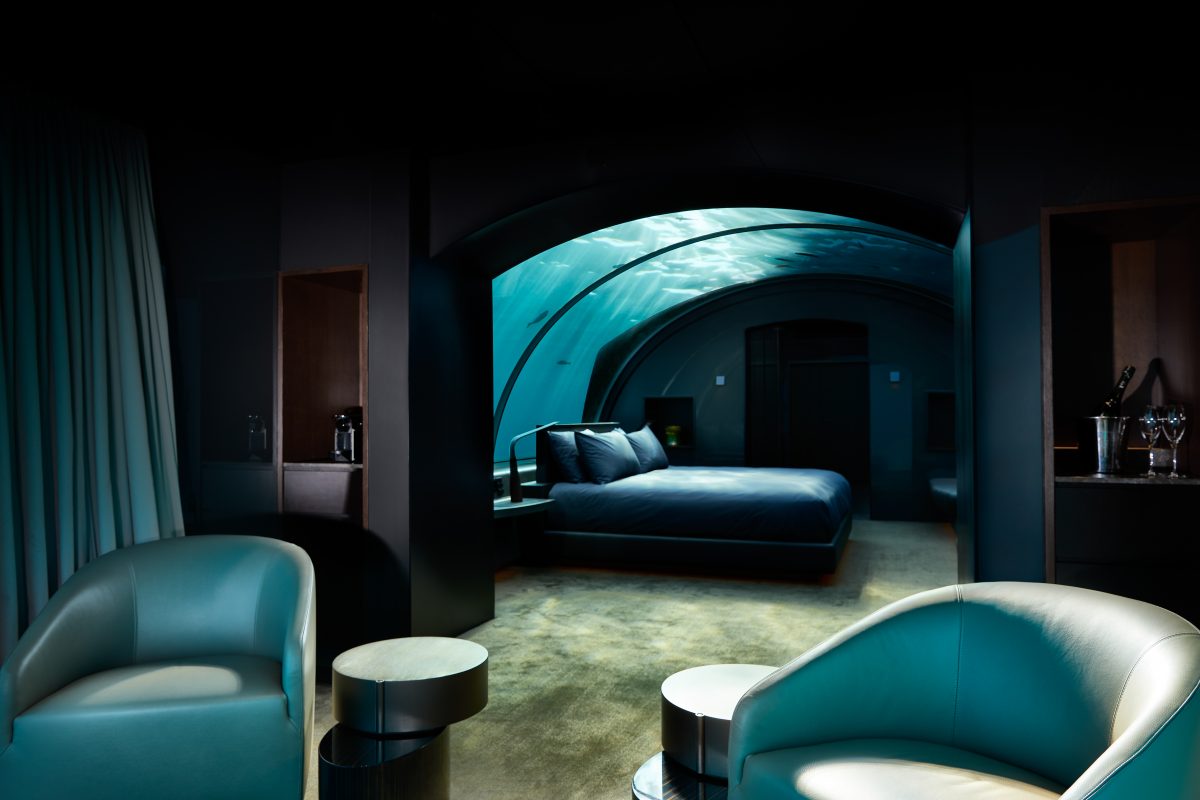
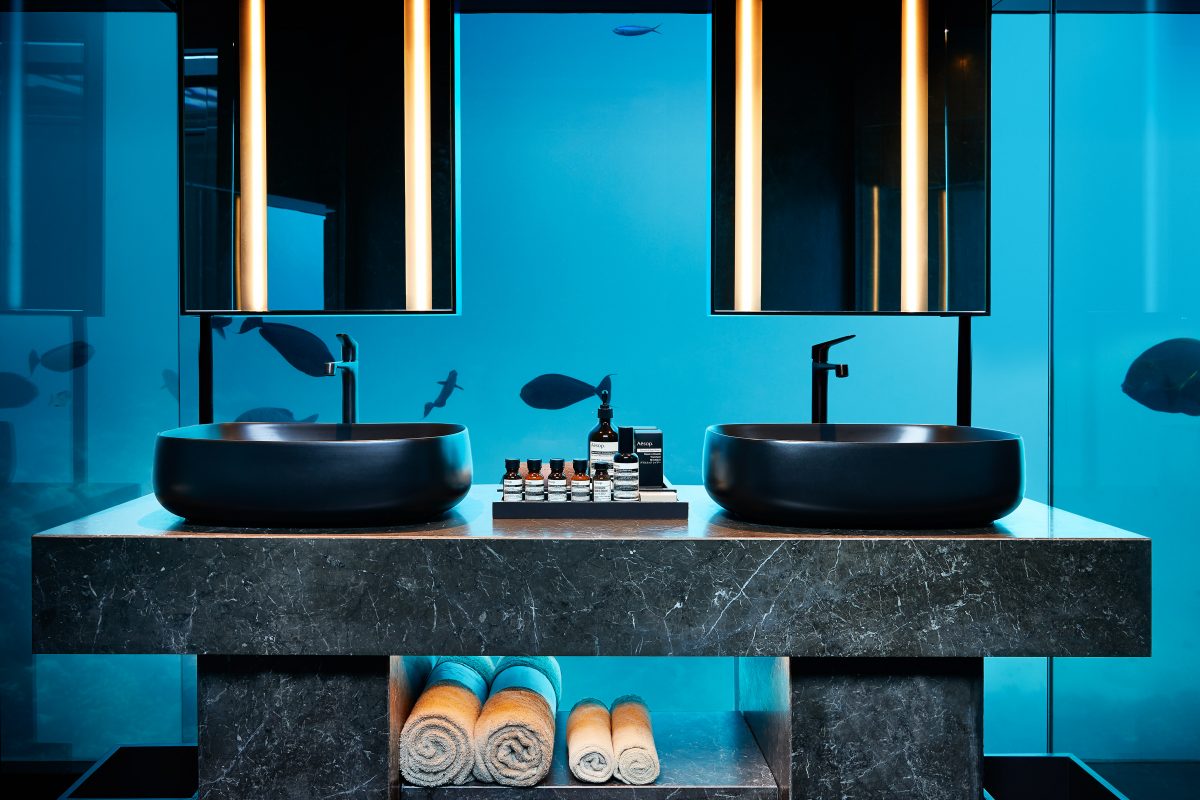

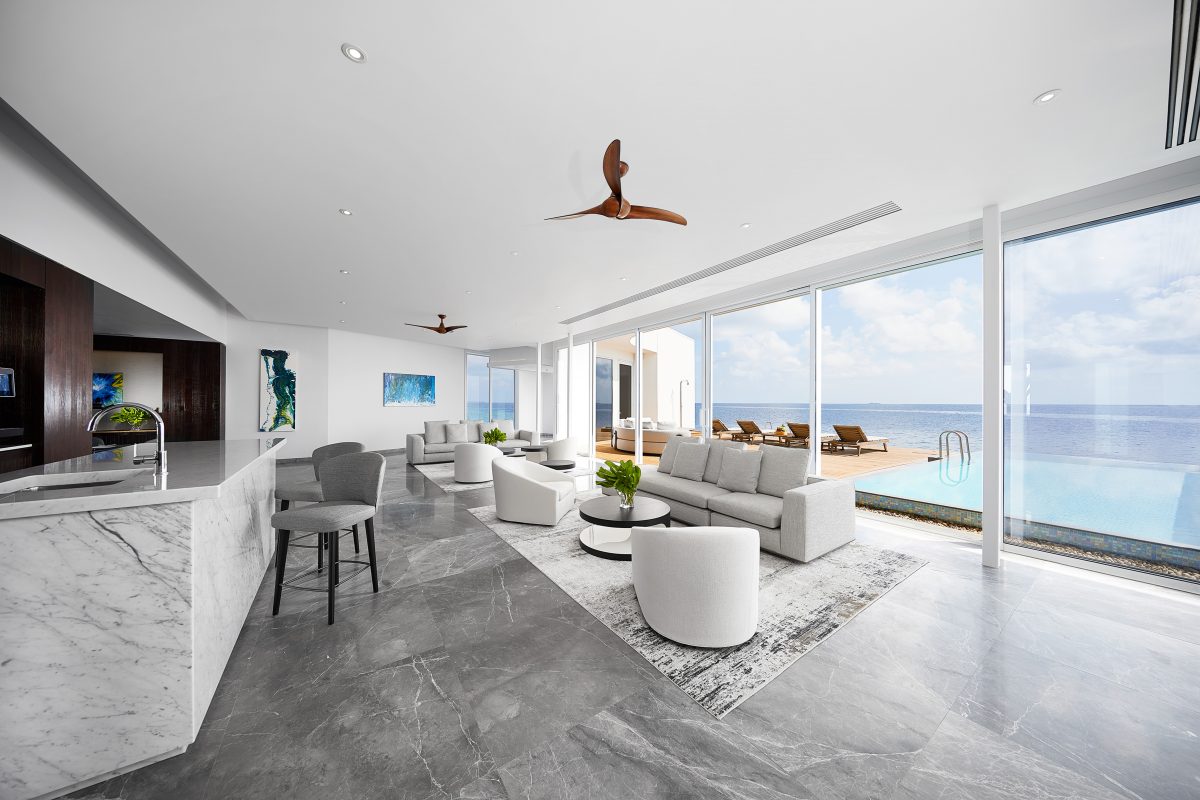
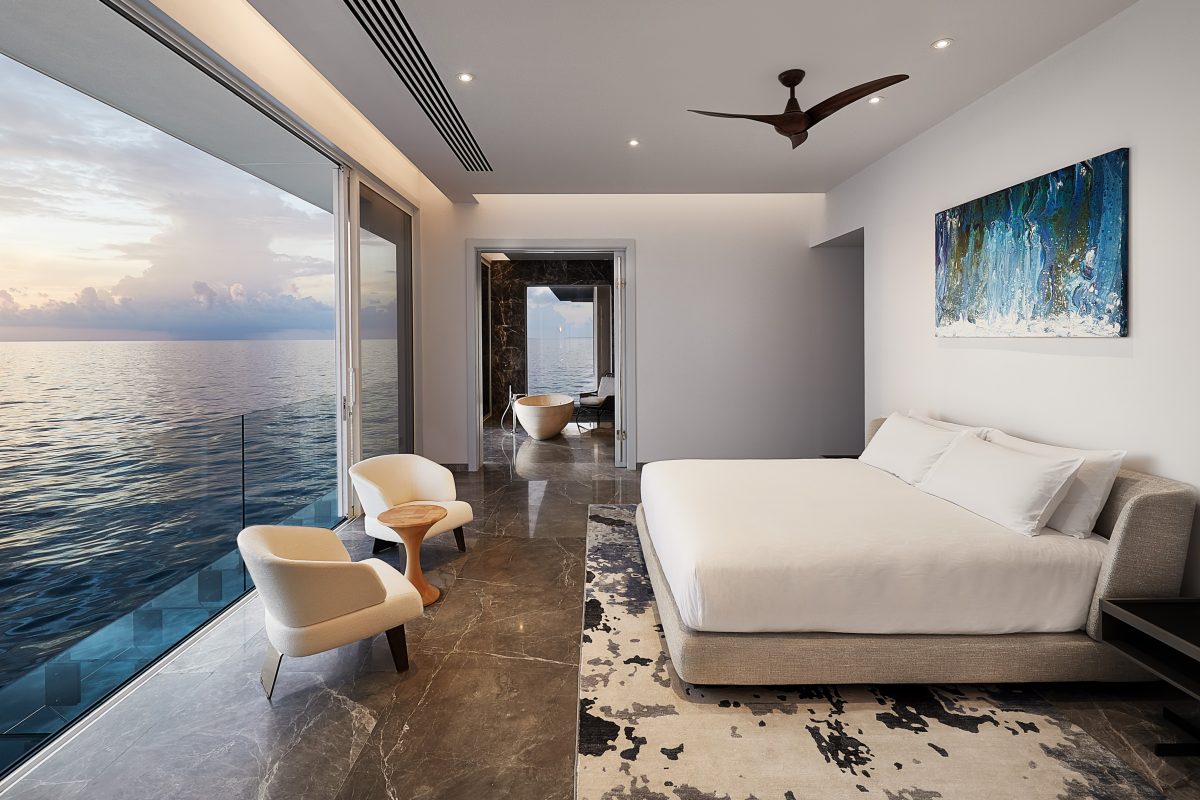
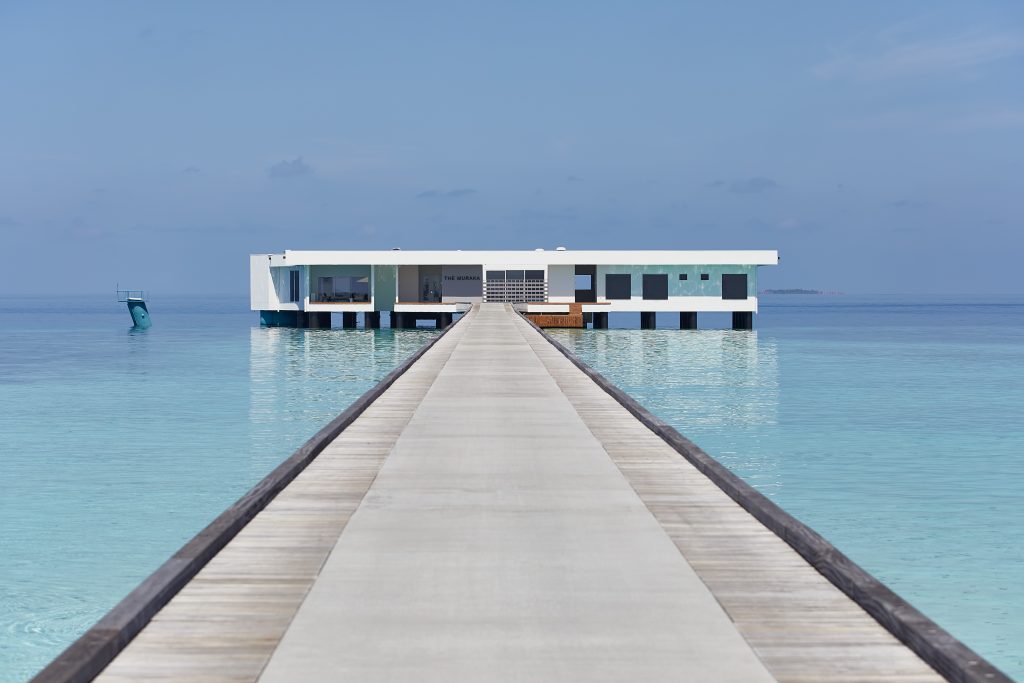
2. Jules’ Undersea Lodge, Florida
This underwater hotel holds a special place in history as the world’s first underwater hotel. Originally built as an underwater research laboratory, it was converted into a lodge in 1986. Located in Key Largo’s Emerald Lagoon, guests must scuba dive 21 feet underwater to reach their rooms.
The lodge gained recent attention when Dr. Joseph Dituri broke the record for the longest time living underwater at ambient pressure at the Jules’ Undersea Lodge in Key Largo. He spent 74 days residing in the lodge, proving that underwater hotel living is more than just a novelty—it’s a viable lifestyle choice for the adventurous.
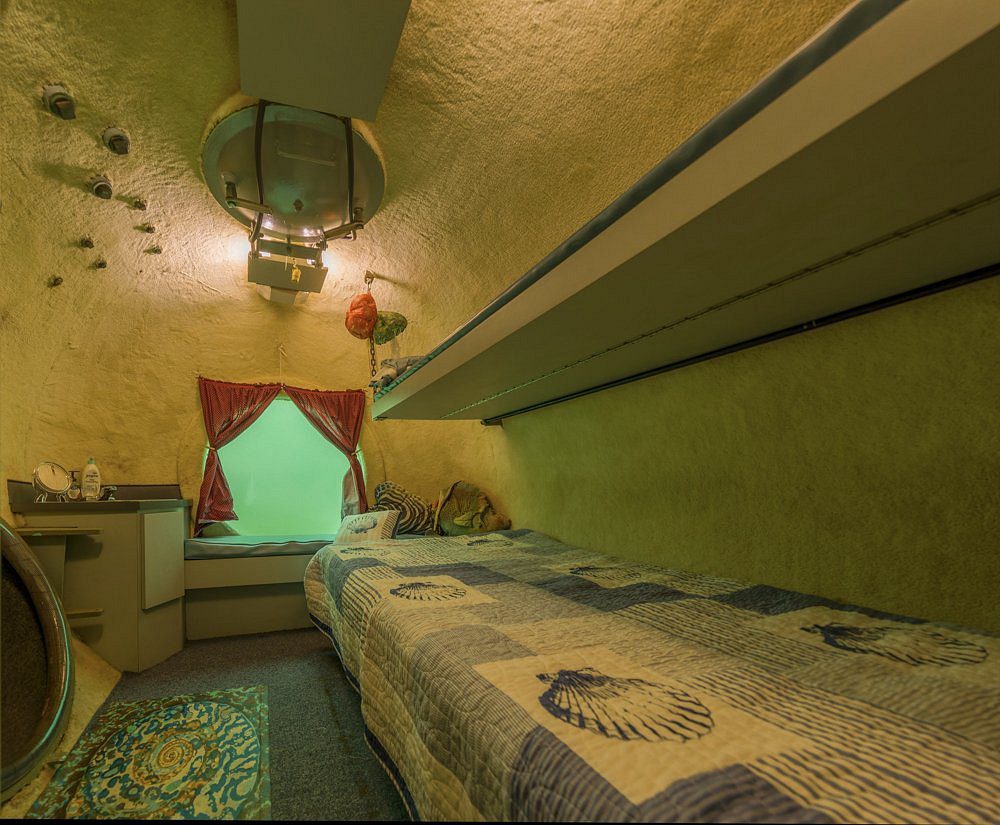
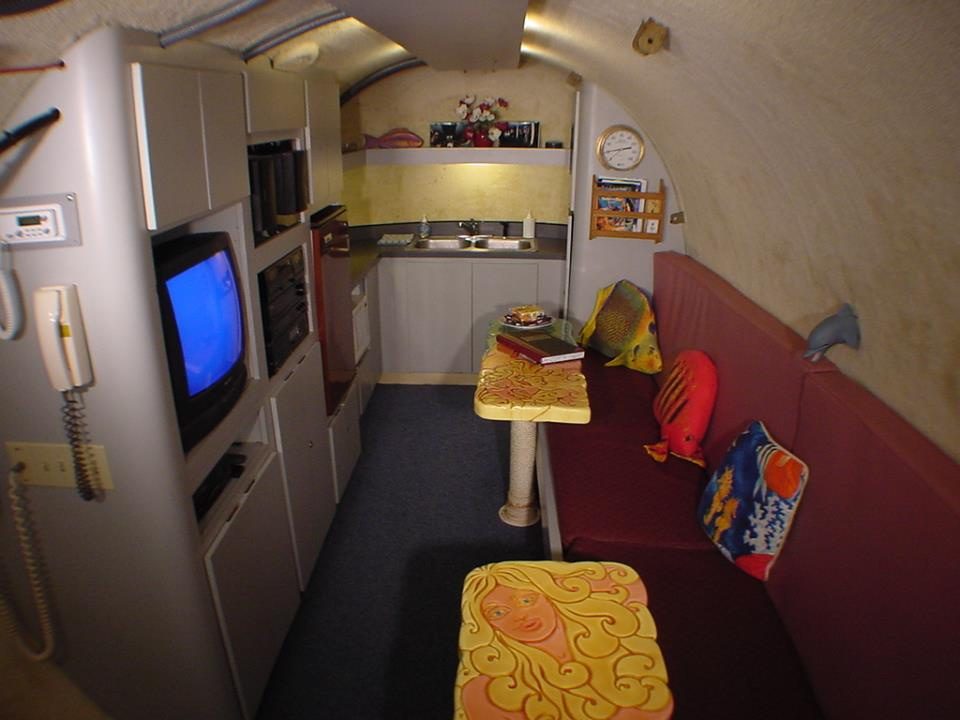
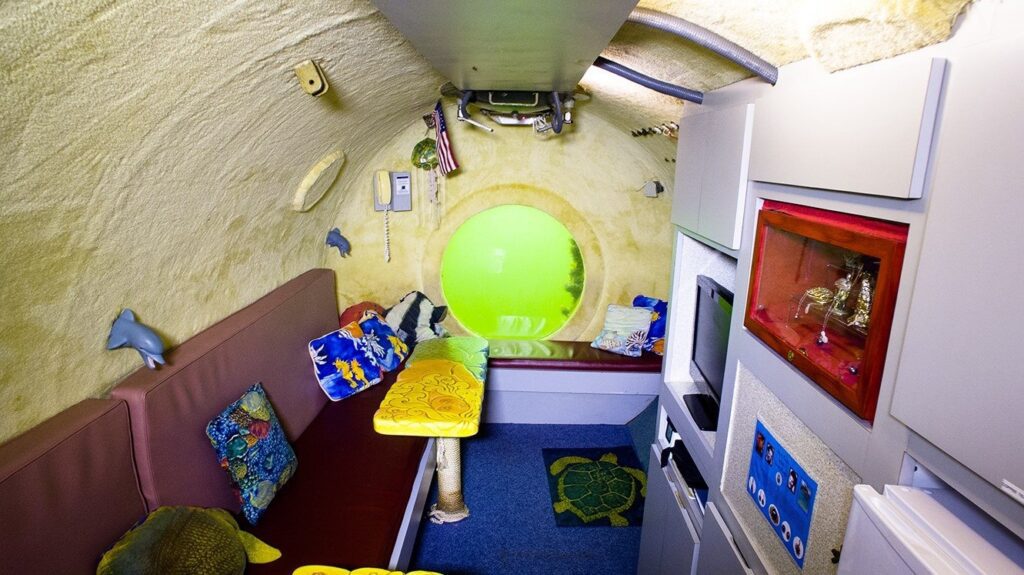
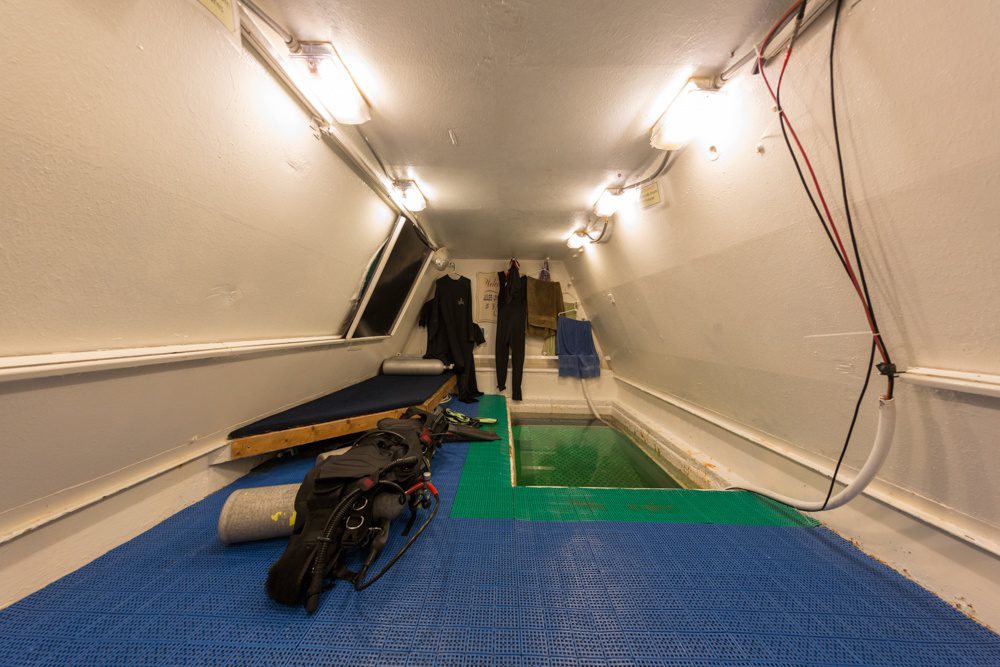
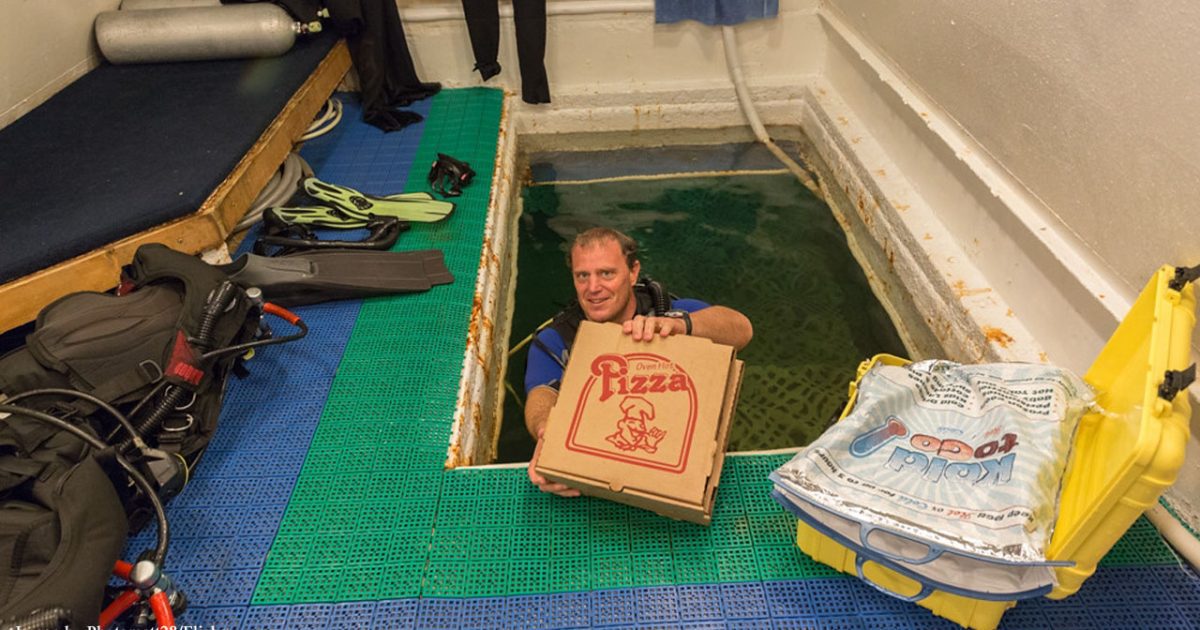
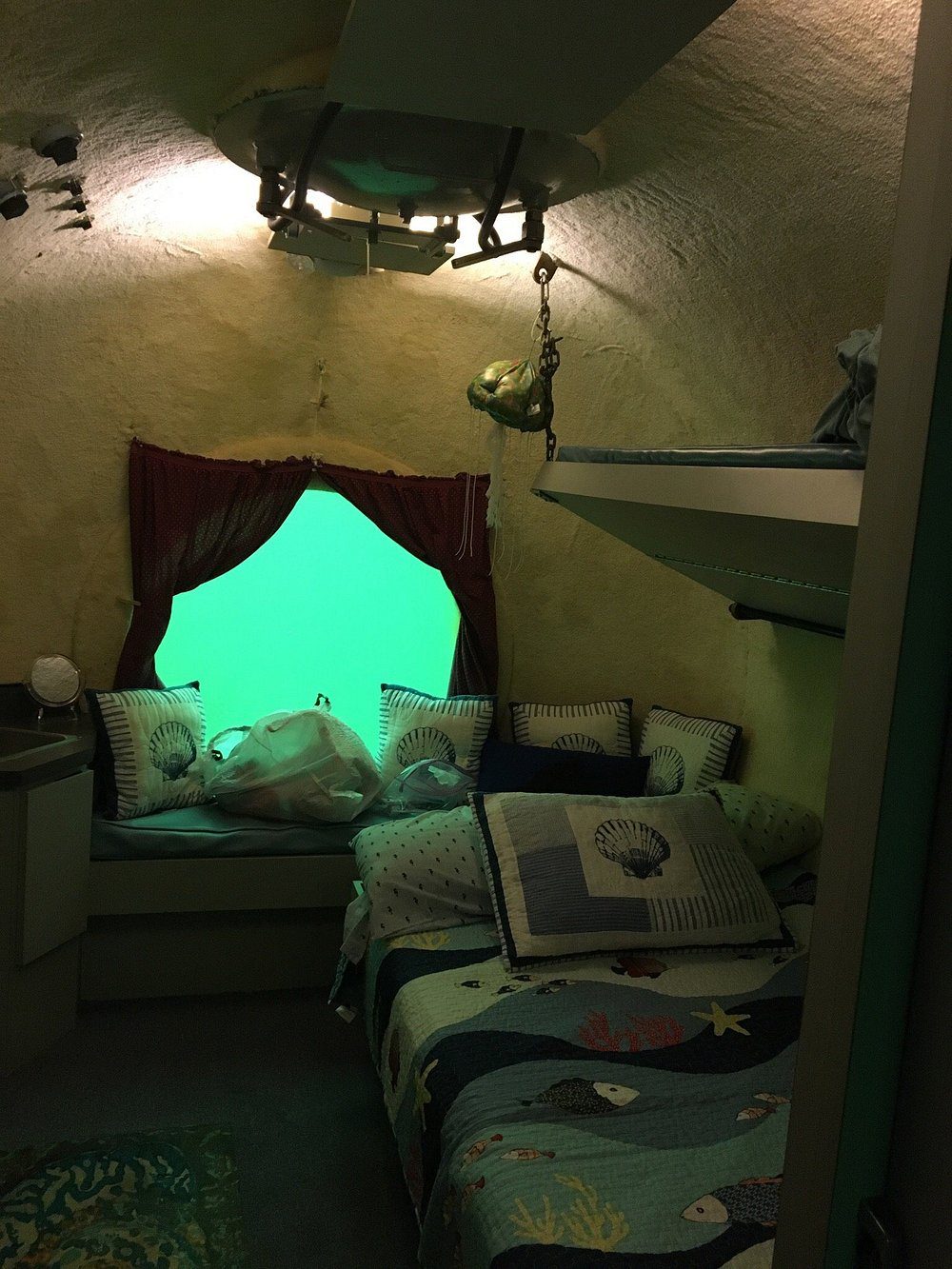
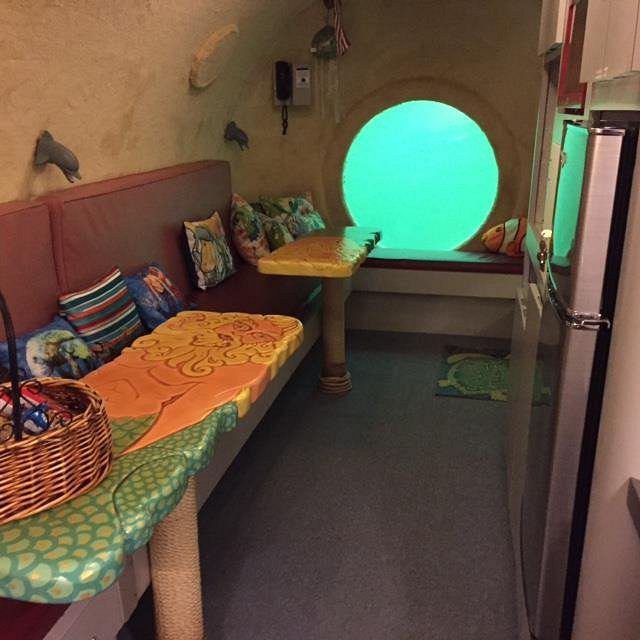
3. Atlantis The Palm, Dubai – Neptune and Poseidon Suites
Dubai’s Atlantis The Palm offers two spectacular underwater suites that epitomize luxury beneath the waves. The Neptune and Poseidon suites feature floor-to-ceiling windows facing the Ambassador Lagoon, home to 65,000 marine animals including sharks, rays, and exotic fish.
These suites blend opulent design with marine wonder. The rooms feature king-sized beds positioned perfectly for optimal marine viewing, marble bathrooms, and 24-hour butler service. It’s like having a private aquarium that happens to be your bedroom wall. The success of these suites has inspired other Dubai underwater hotel projects throughout the region.
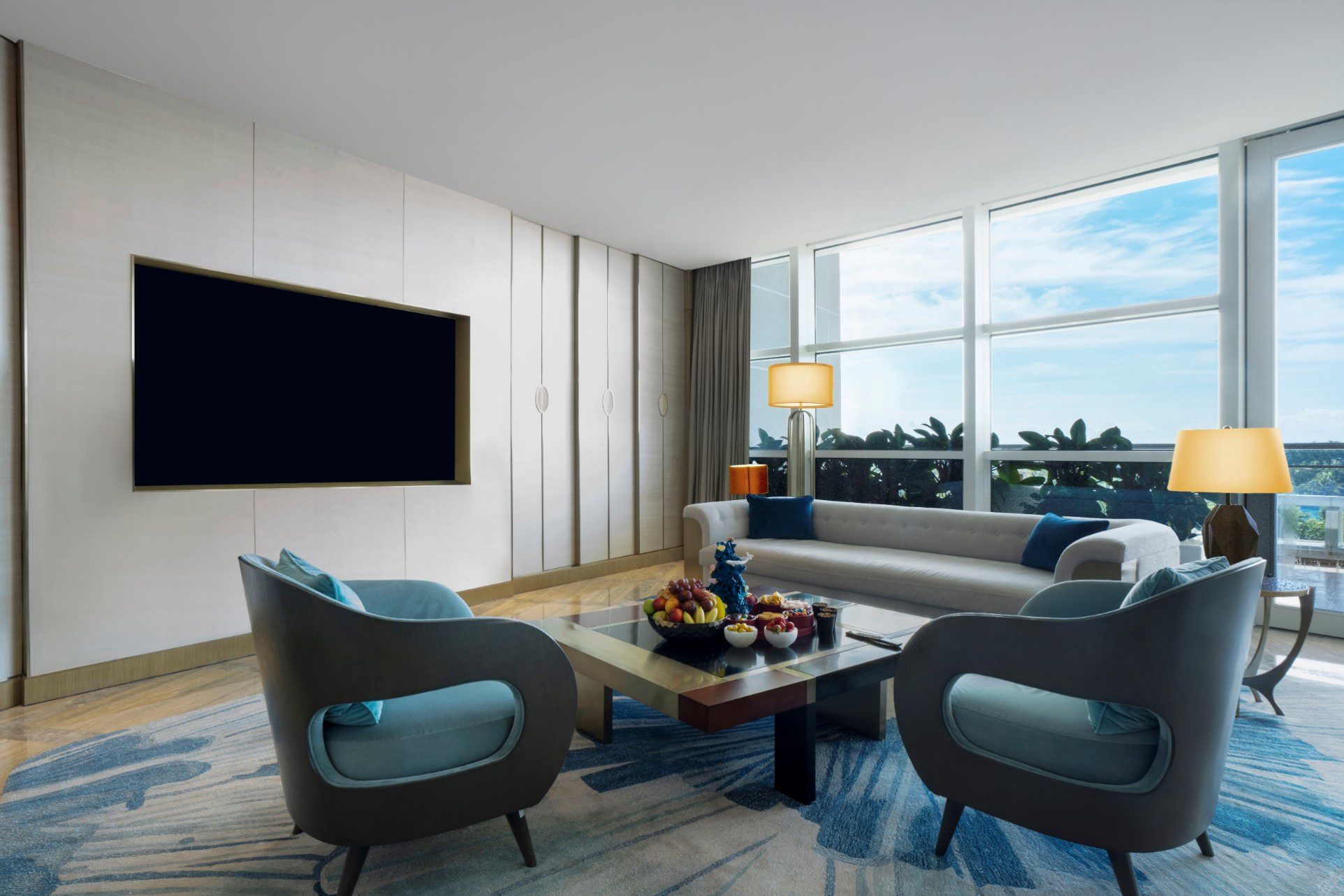

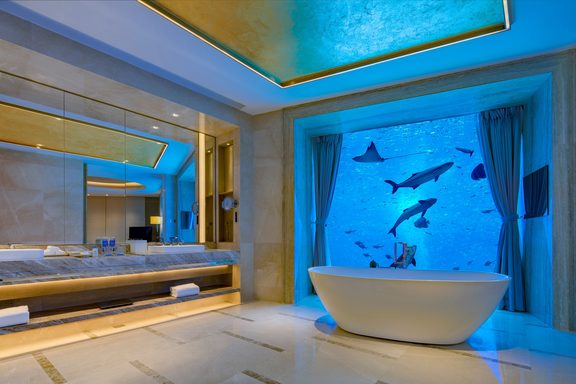
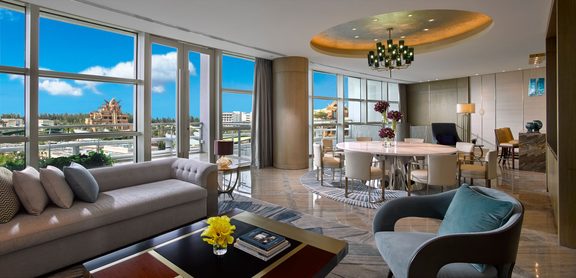
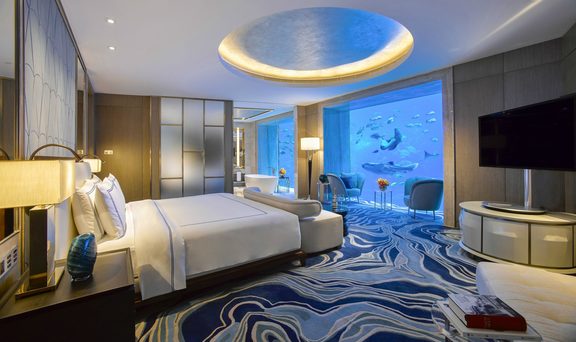
4. Utter Inn, Sweden
Sometimes the most unique experiences come in the simplest packages. The Utter Inn in Lake Mälaren, Sweden, proves this point beautifully. This floating one-room hotel appears modest from the surface—just a small red cabin bobbing on the water. But the real magic happens below.
The bedroom sits three meters underwater, with windows on three sides providing panoramic views of the lake’s ecosystem. Pike, perch, and other freshwater species create a constantly changing underwater ballet outside your windows.
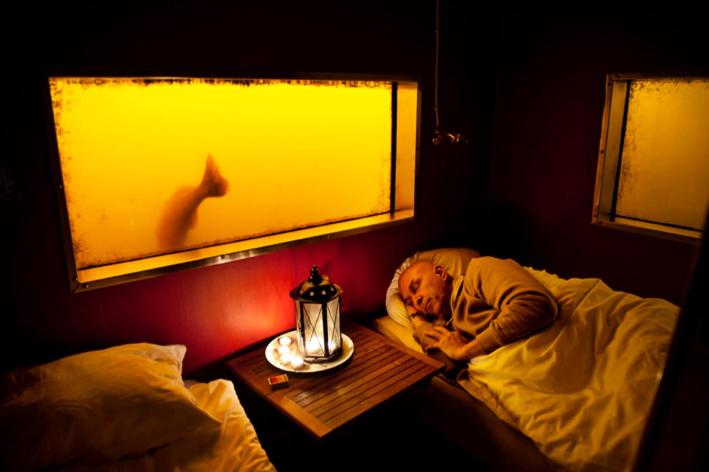
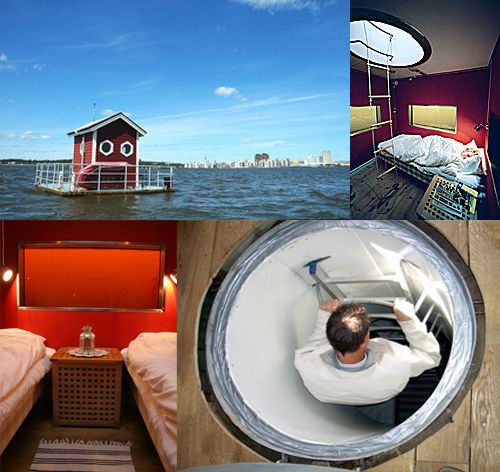

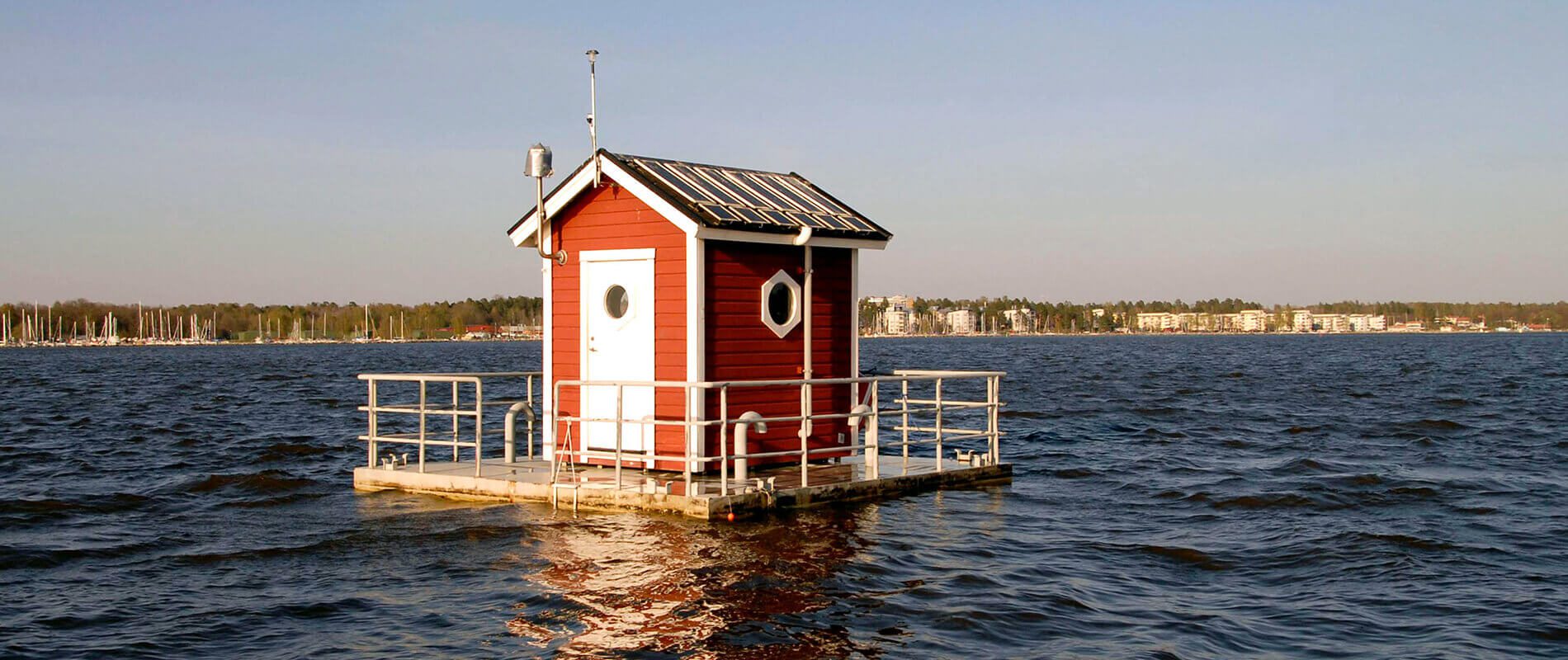
5. Lovers Deep, St. Lucia
For the ultimate romantic getaway, Lovers Deep takes underwater hospitality to new depths—literally. This luxury submarine hotel can be positioned anywhere in the Caribbean waters around St. Lucia, offering complete privacy and unparalleled marine views.
The submarine features a bedroom, bathroom, and dining area, all with panoramic windows. The experience includes a personal chef, butler, and captain. It’s essentially a luxury yacht that happens to operate underwater, making it perfect for proposals, anniversaries, or simply escaping the world above.
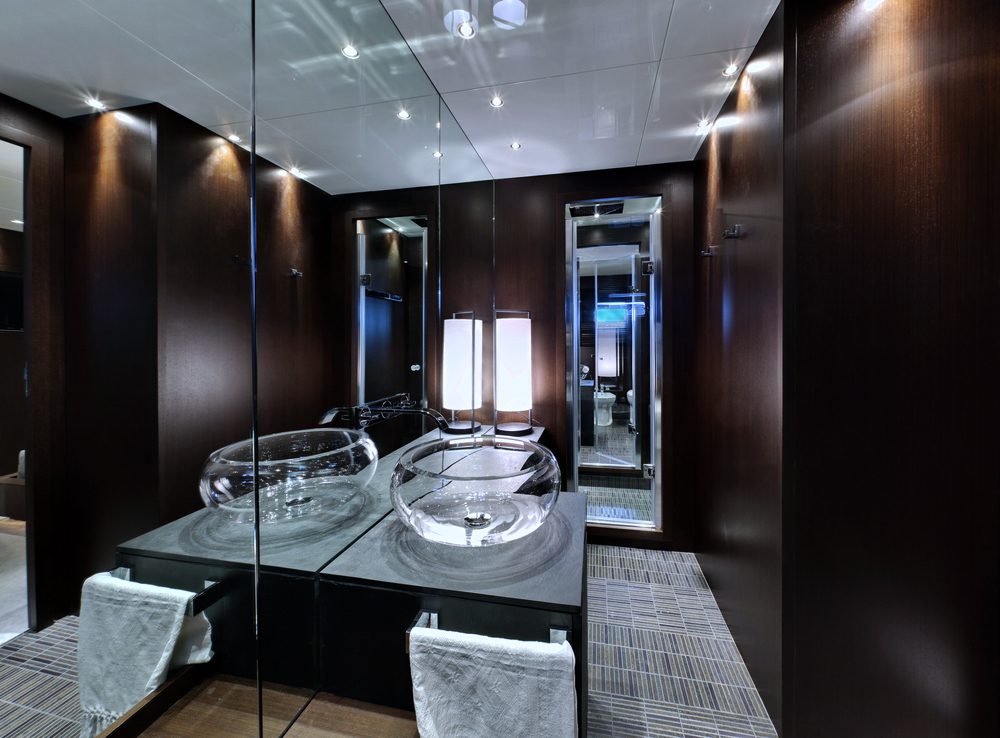
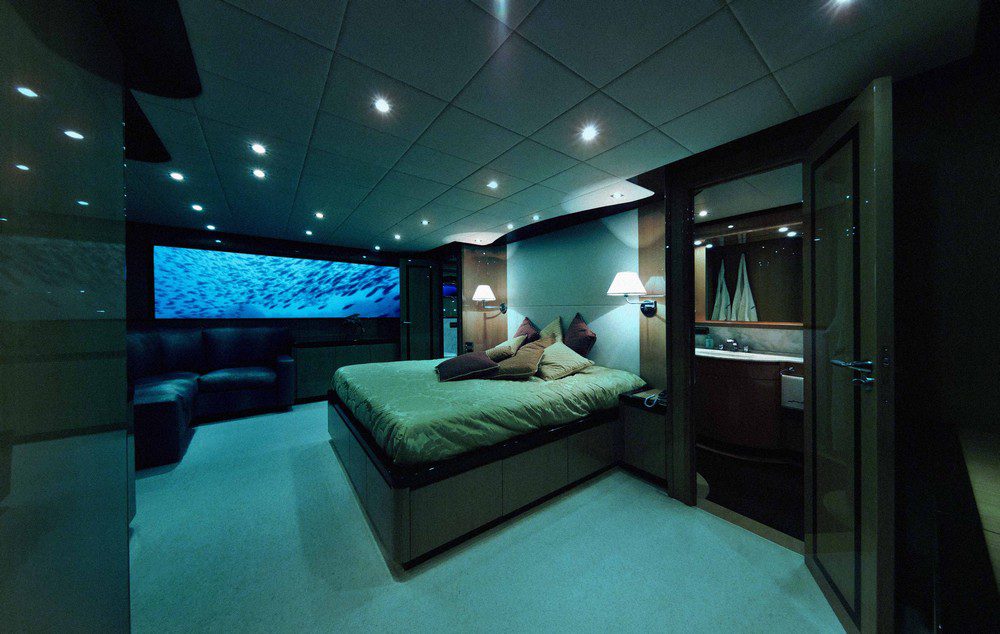
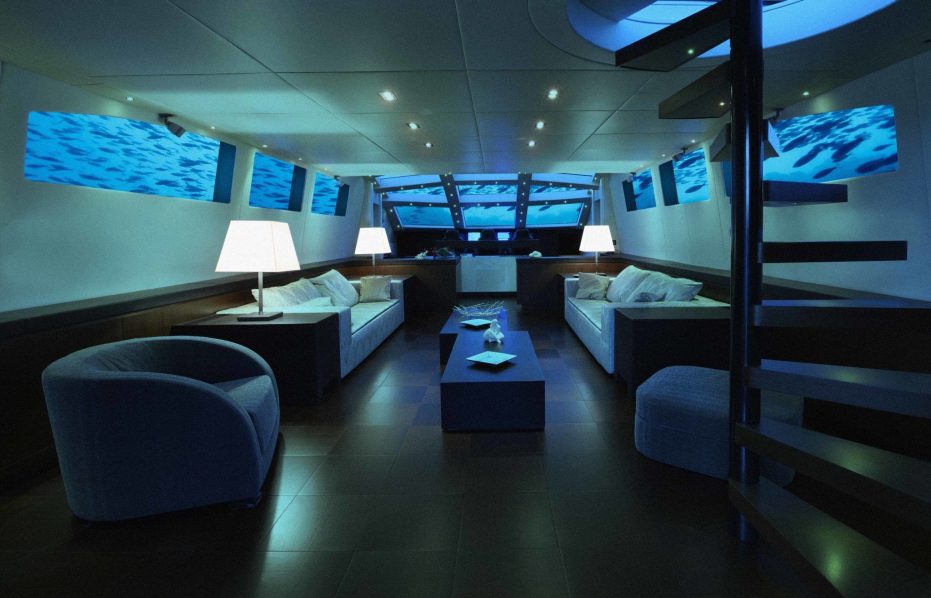
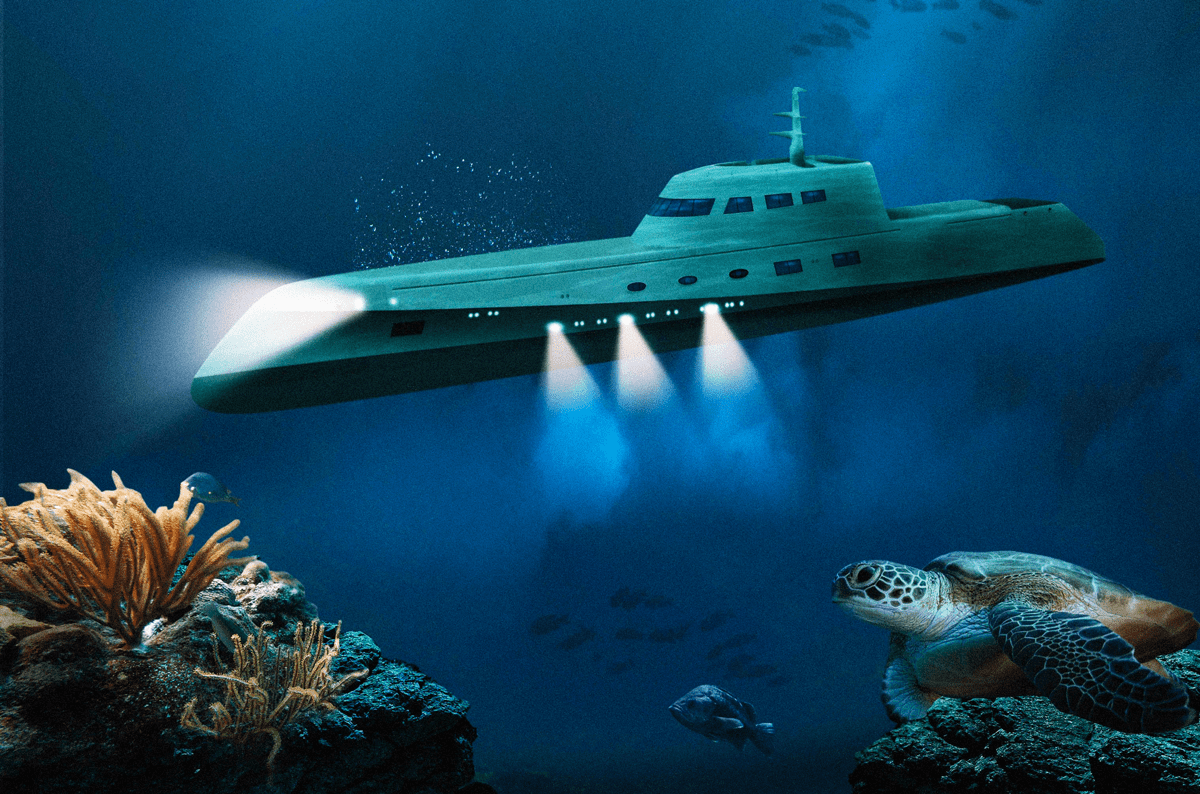
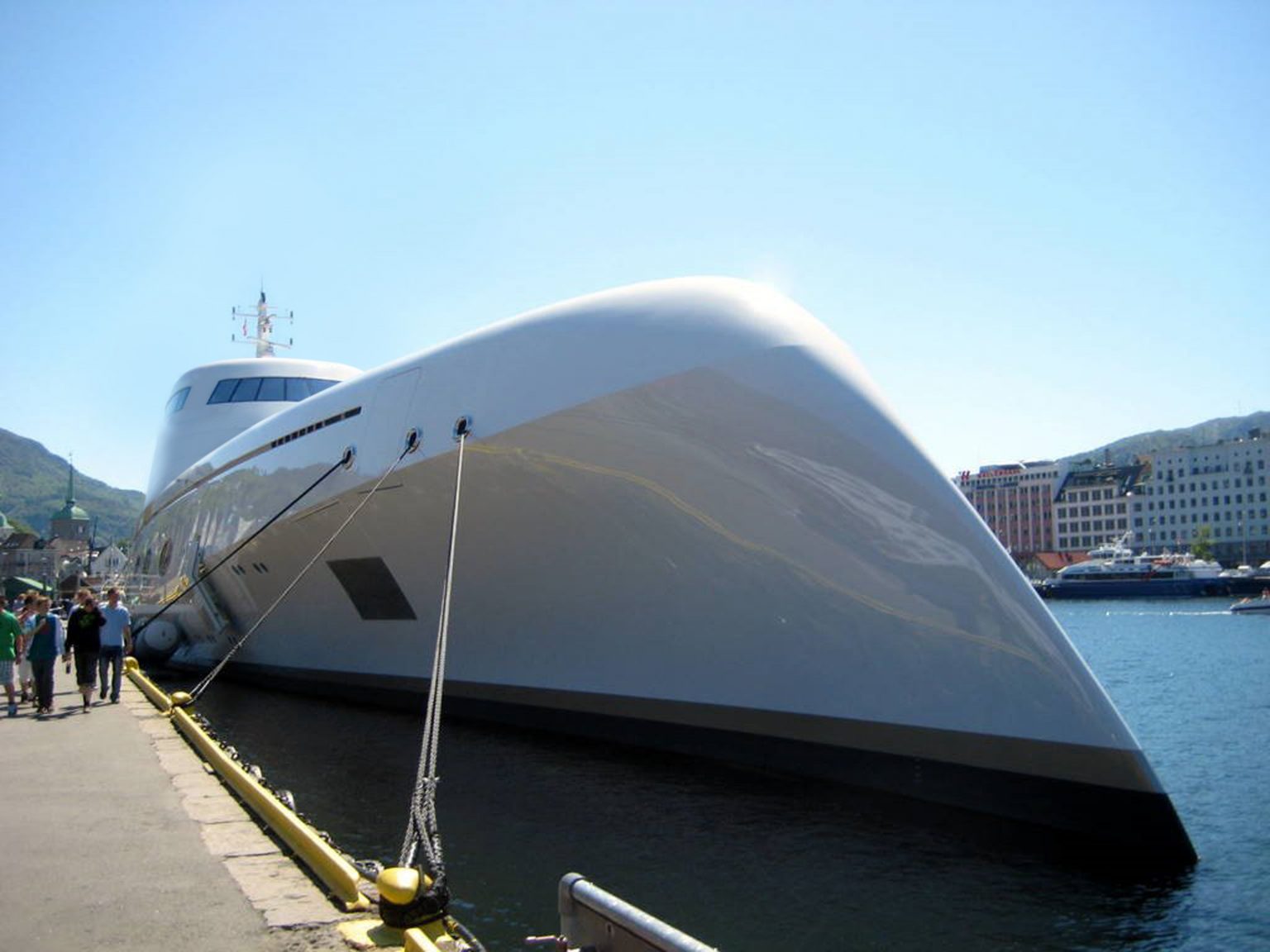
6. Huvafen Fushi, Maldives
The world’s first underwater spa takes relaxation to oceanic depths. Huvafen Fushi’s underwater treatment rooms are located eight feet below the surface, where you can enjoy massages while tropical fish swim overhead through glass ceilings.
In June 2024, Huvafen Fushi Maldives announced the completion of its significant refurbishment, modernizing the facilities while maintaining the magical underwater experience that made it famous.
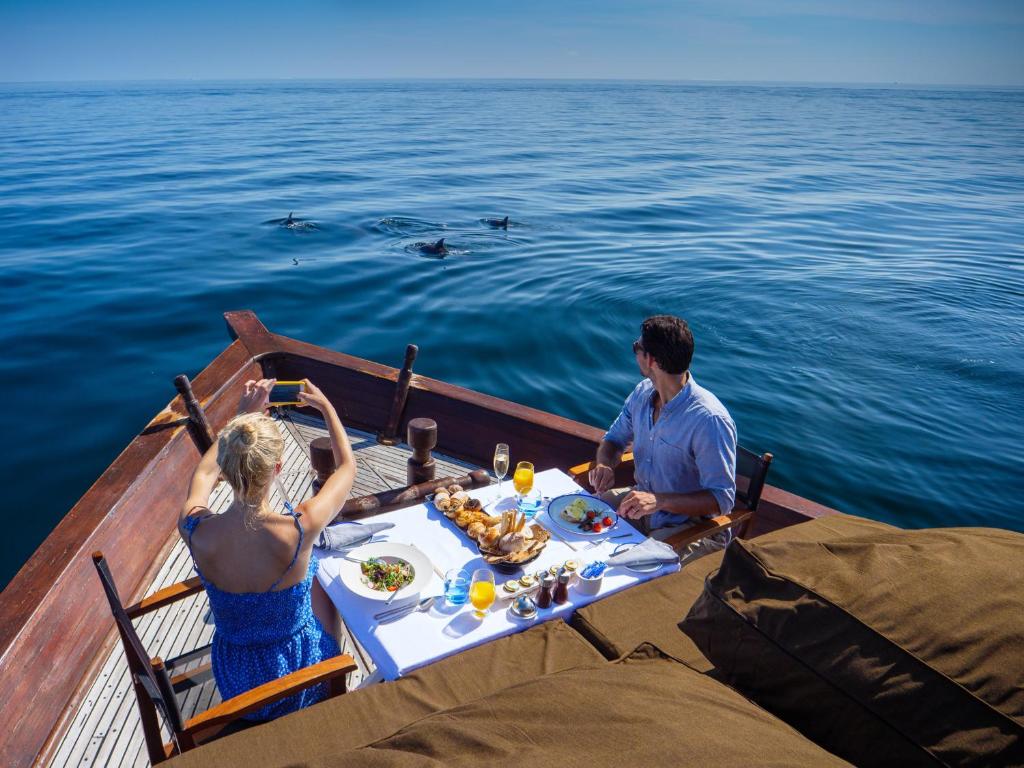
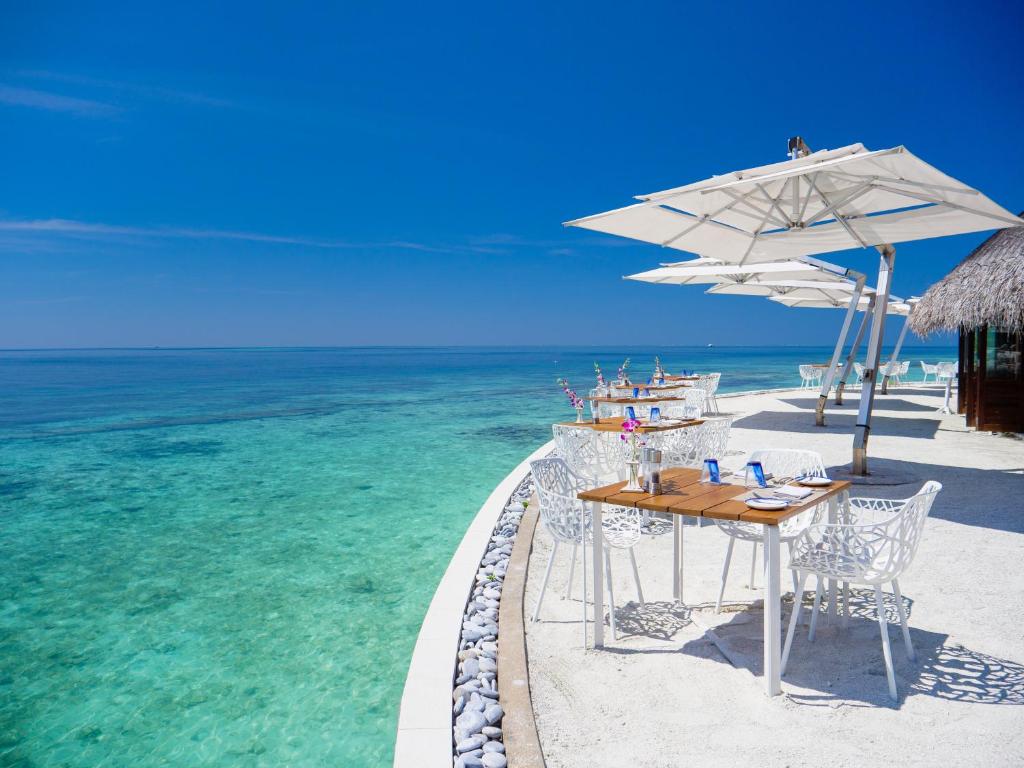
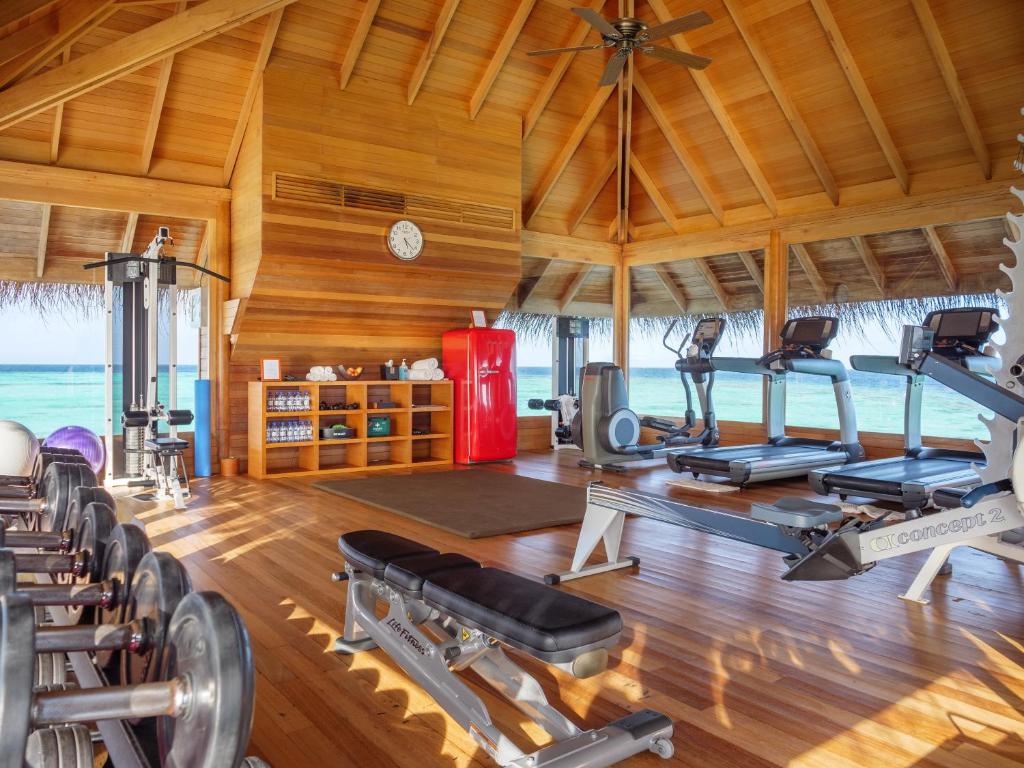
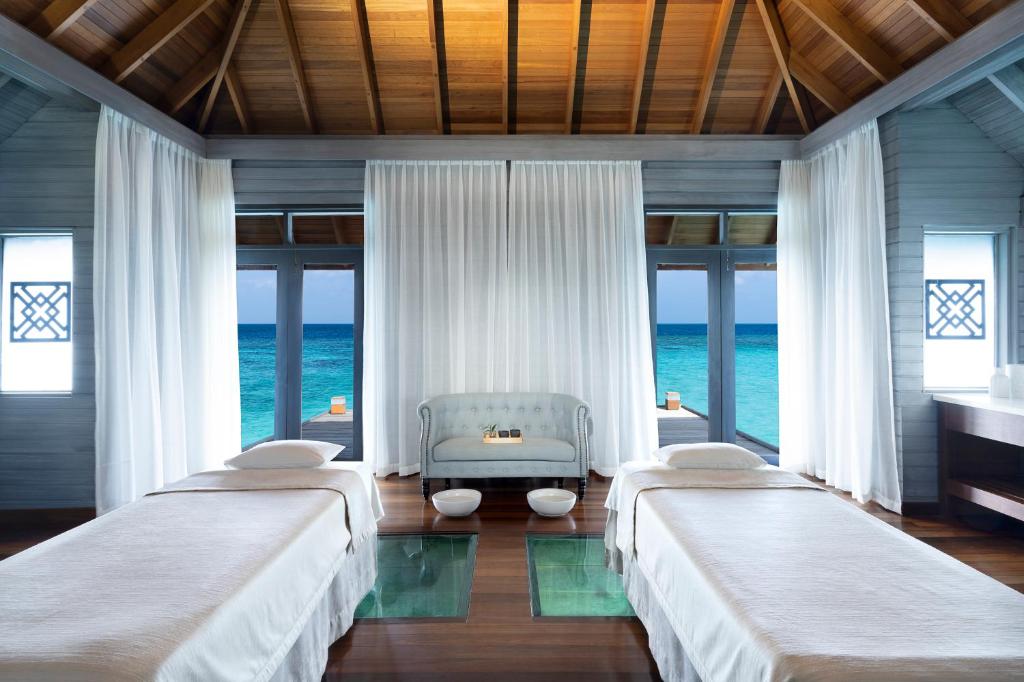
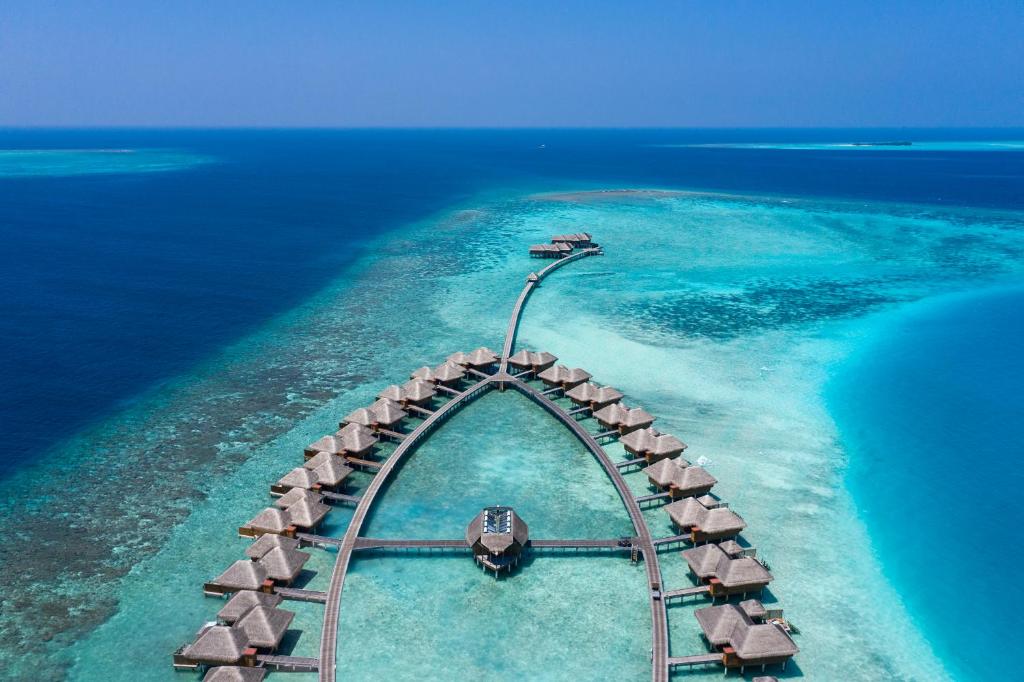
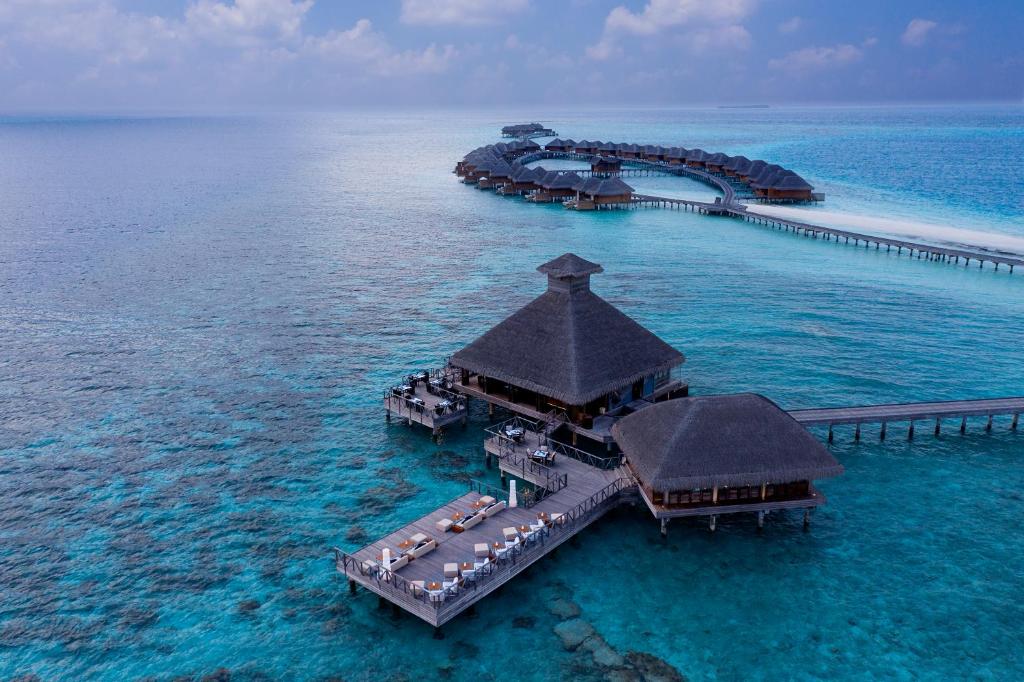
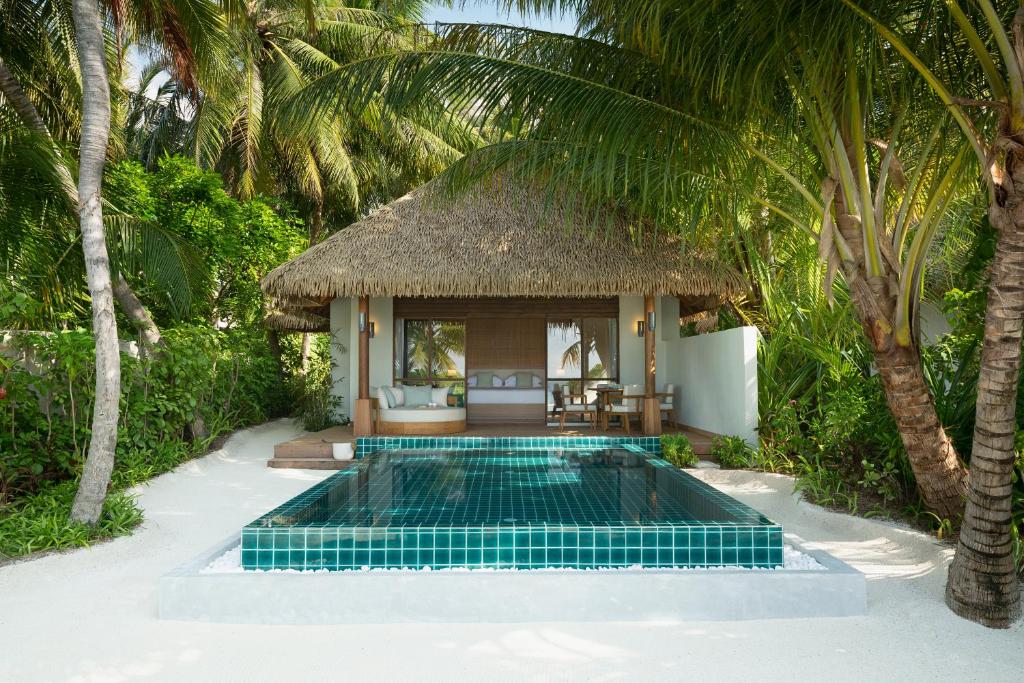
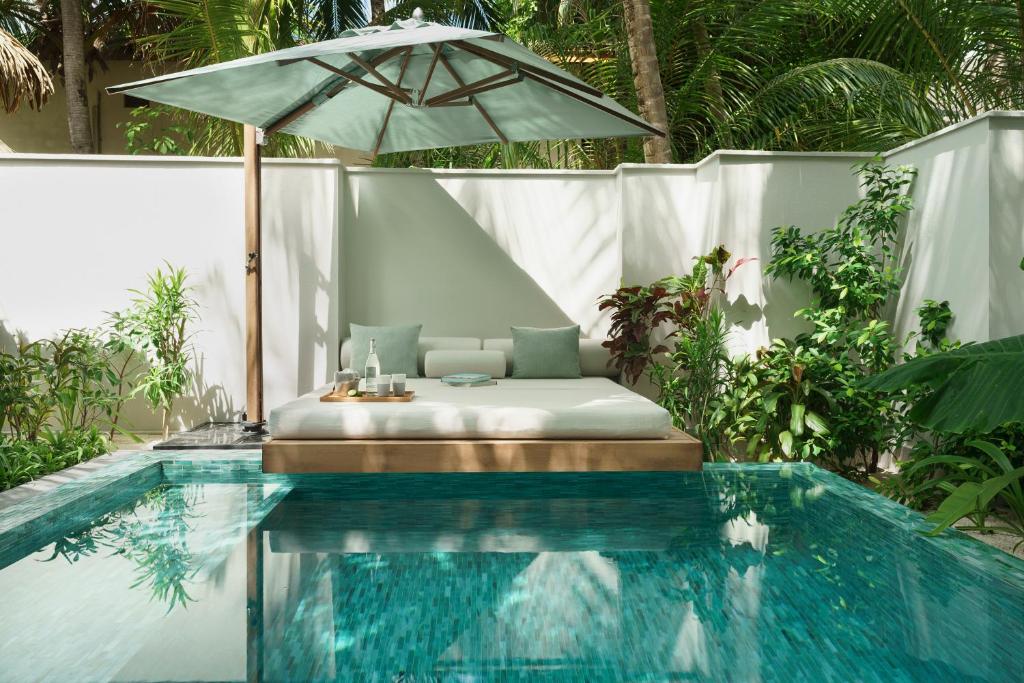
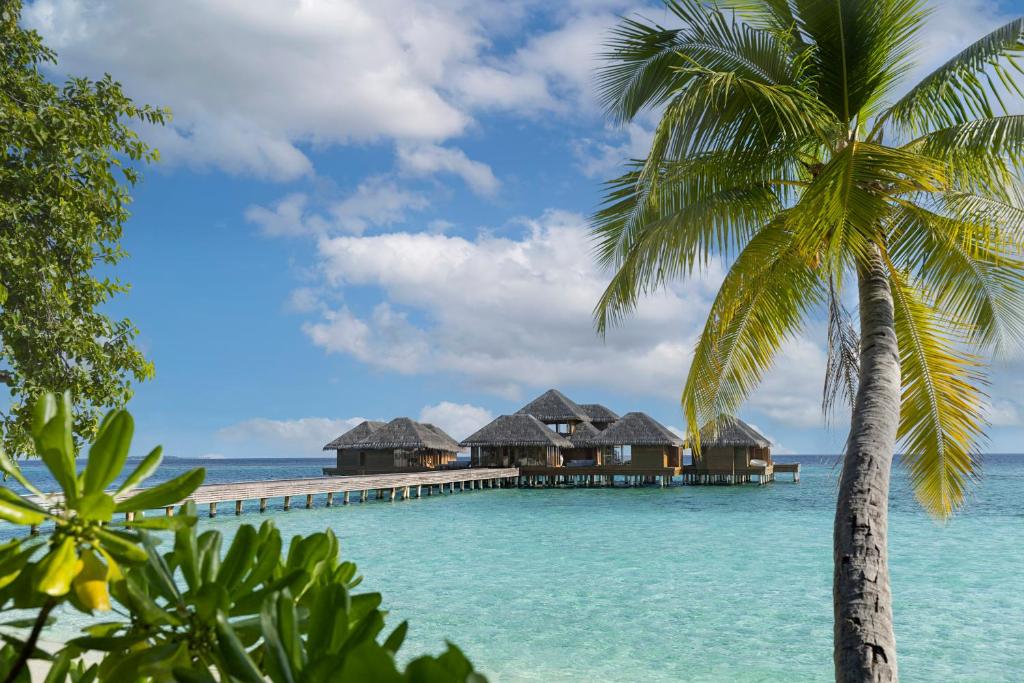
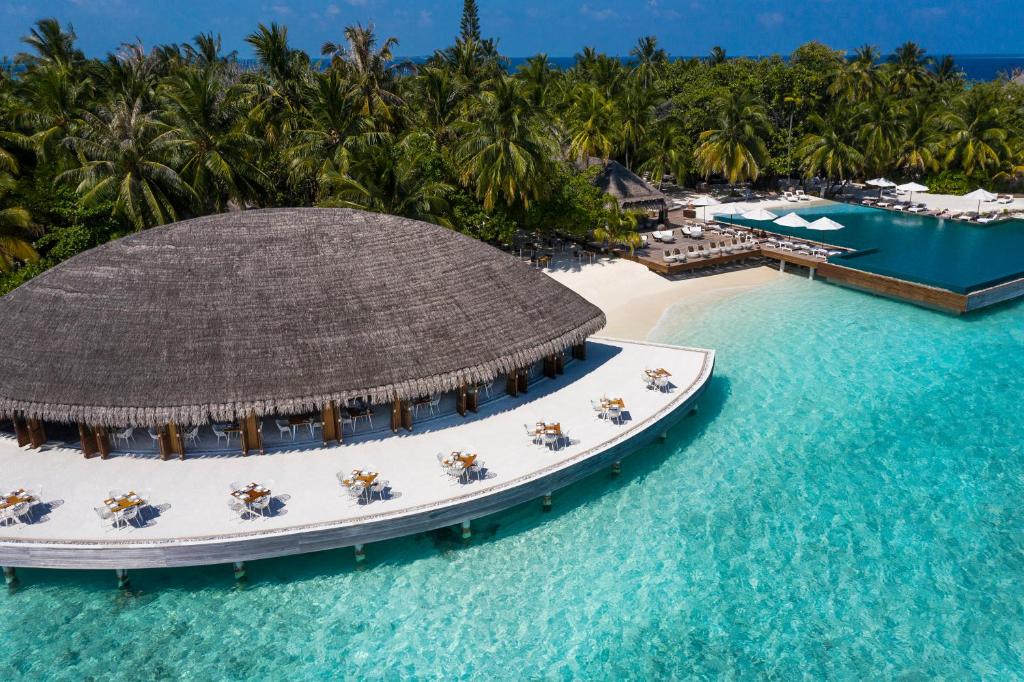
7. Subsix at Niyama Private Islands, Maldives
Subsix operates as the world’s first underwater nightclub and restaurant, transforming from a fine dining venue during the day to an underwater dance floor at night. Located 20 feet below the surface, the club features a unique aquarium-style design with panoramic windows offering 360-degree ocean views.
The venue hosts underwater parties complete with DJs, dancing, and champagne service—all while surrounded by the Indian Ocean’s marine life.
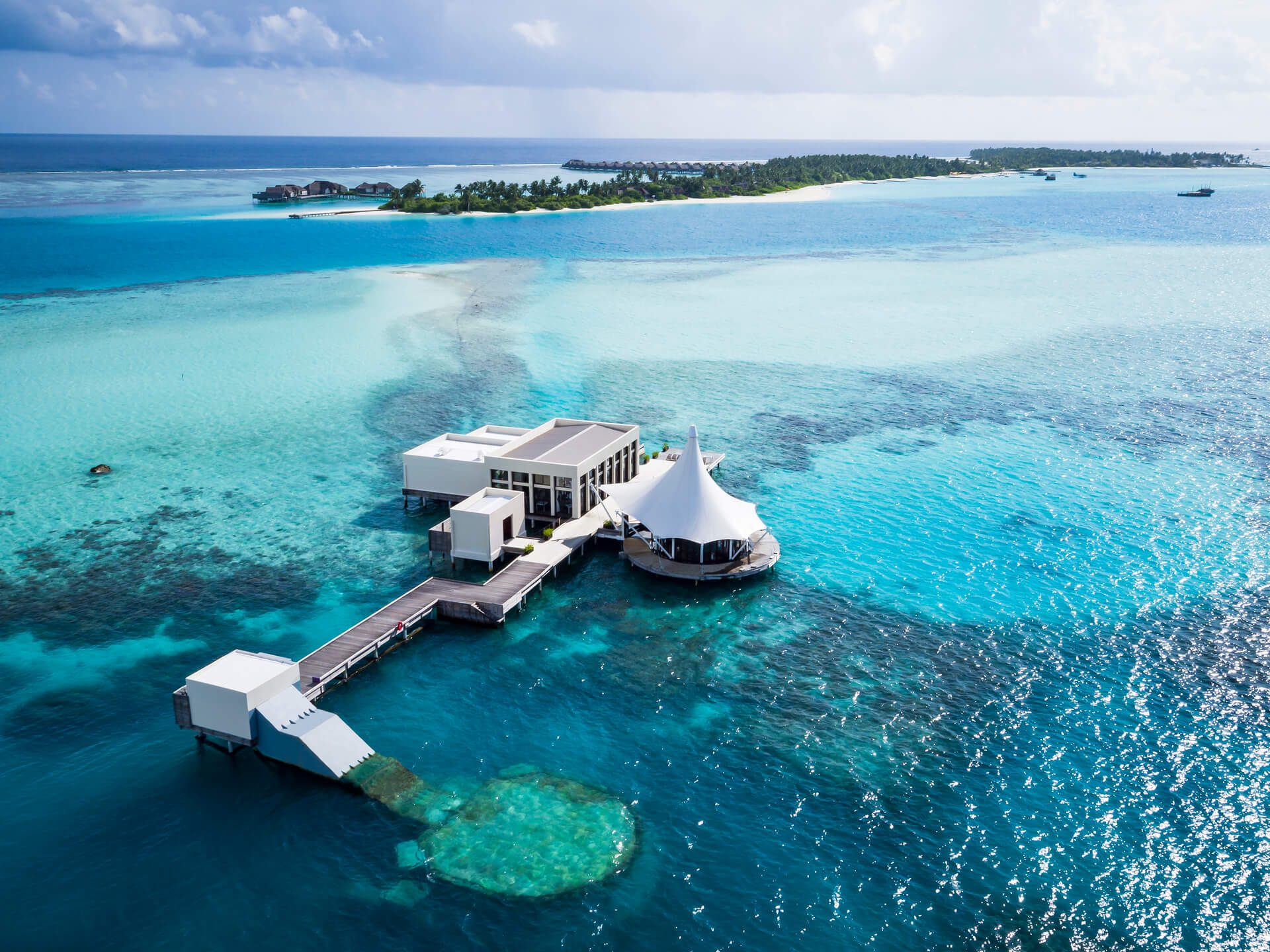
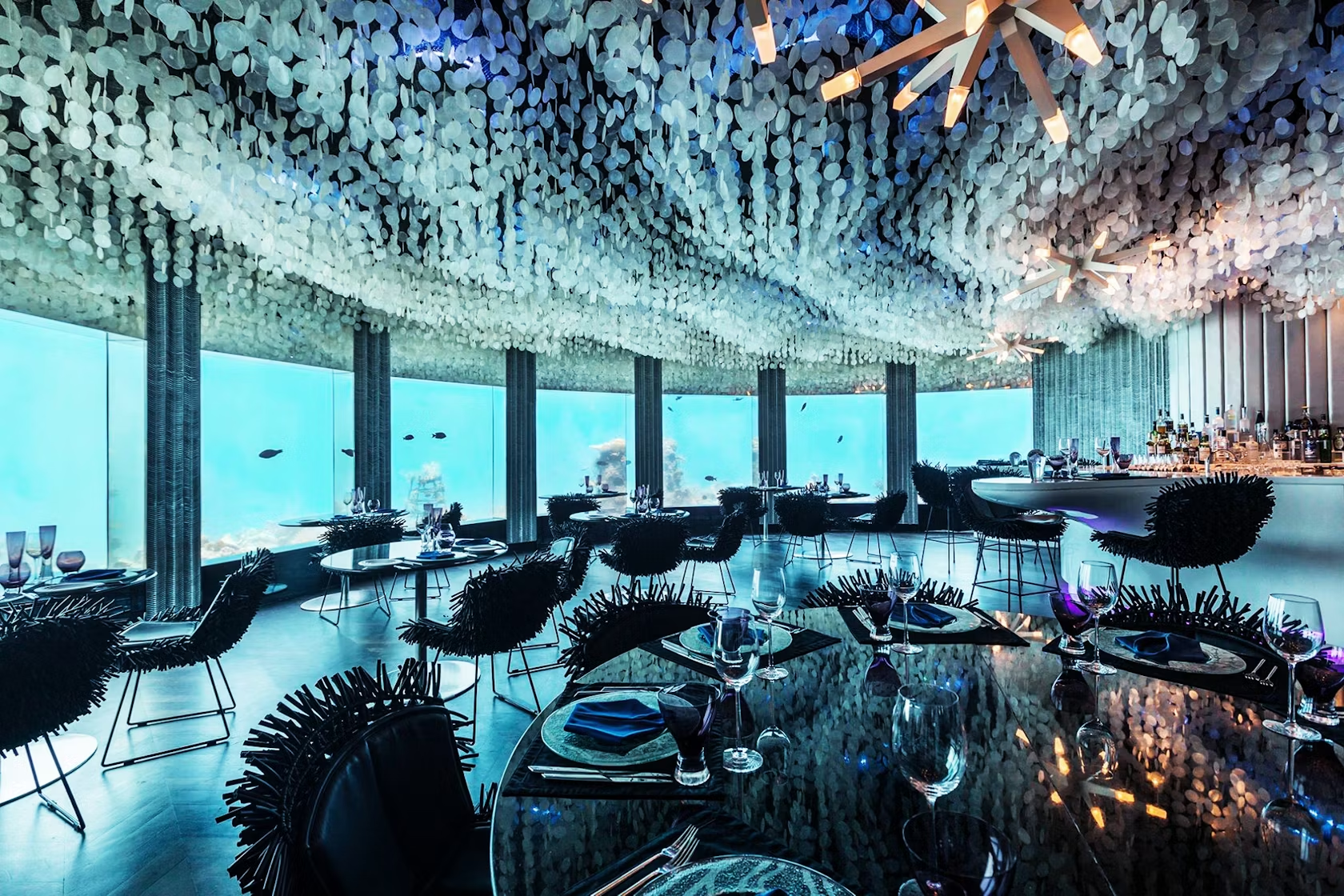
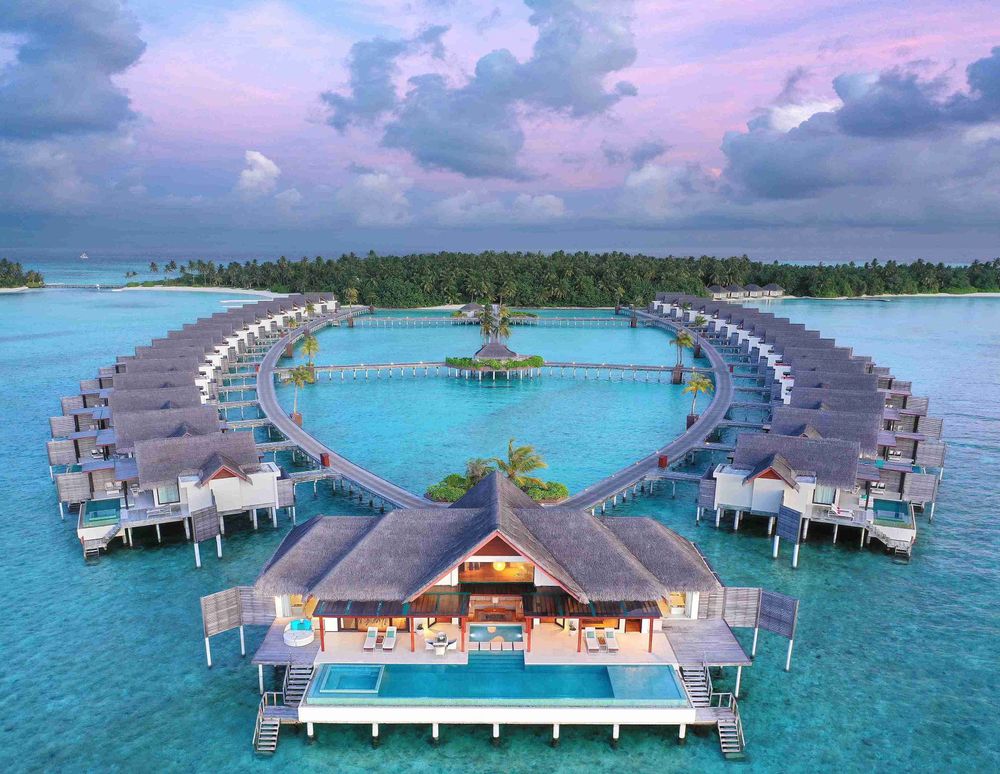
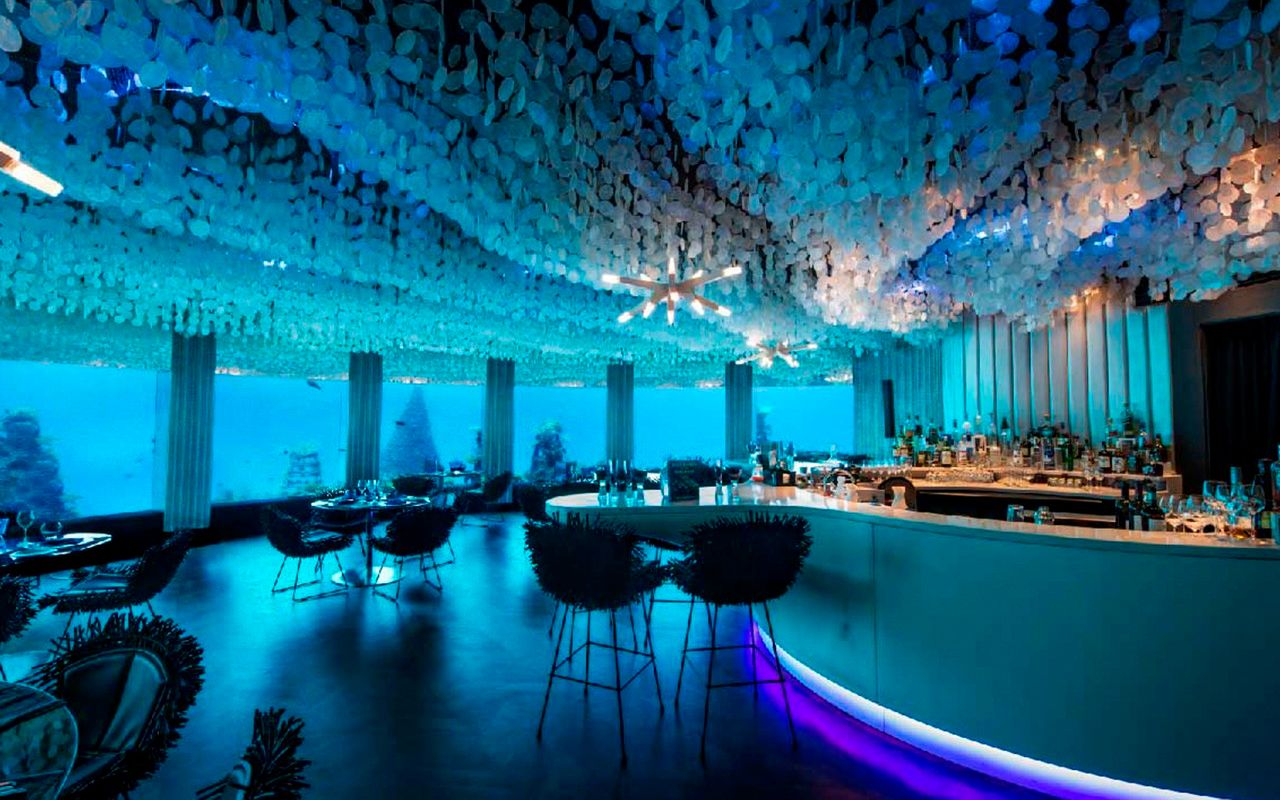
8. The Hydropolis, Dubai (Planned)
Though still in development, the Hydropolis promises to be the world’s first luxury underwater hotel and resort. The project, designed by Deep Ocean Technology, will feature Dubai’s most ambitious underwater hotel with 220 suites located 60 feet beneath the Persian Gulf.
The three-part structure includes a land station, a connecting tunnel, and the underwater hotel itself. Once completed, it will offer restaurants, ballrooms, and even an underwater shopping mall.
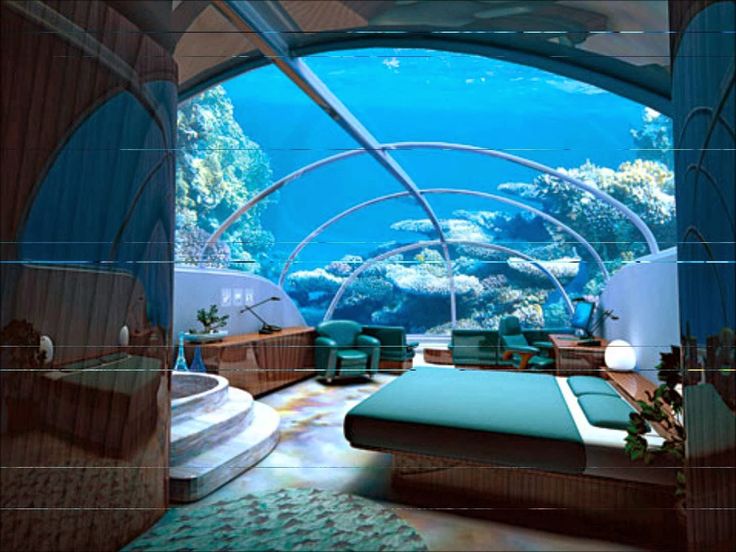
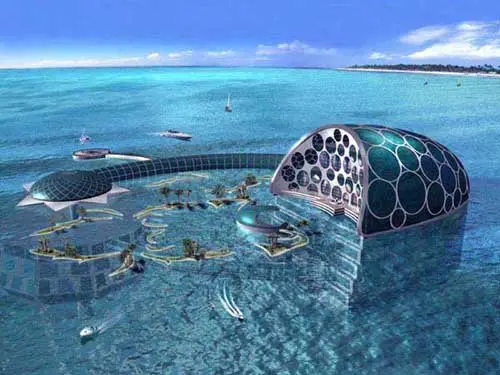
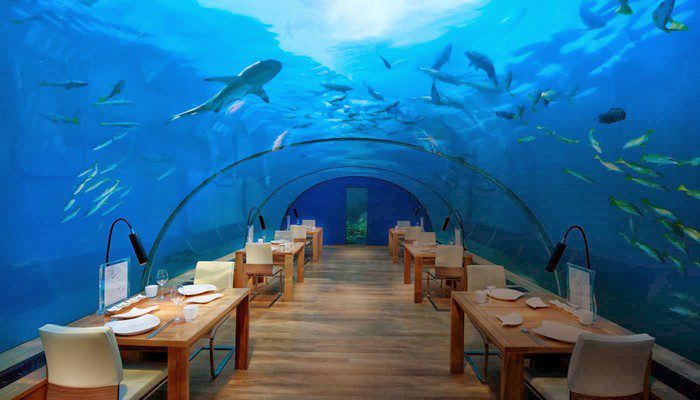
9. Water Discus Hotel, Dubai
Water Discus Hotel in Dubai is an under construction project by Deep Ocean Technology and is one of those equivalents of mobile homes that are well in trend nowadays. To be one of the best underwater hotels in the world, this accommodation is constructed and built in Poland, imported to Dubai.
The unique disc-shaped design features both underwater and above-water accommodation, connected by a central shaft. The underwater portion will house 21 rooms with panoramic ocean views, while the surface disc contains reception areas, restaurants, and a helipad.
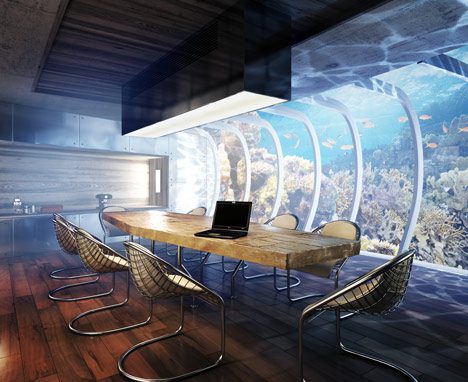
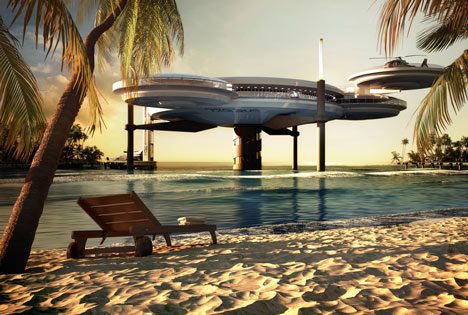
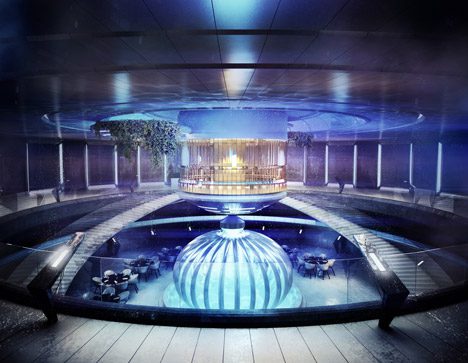
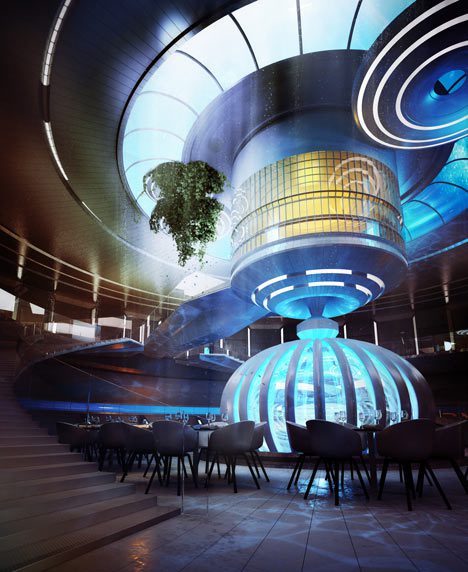
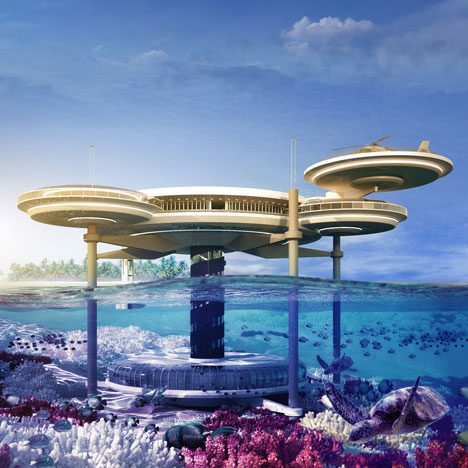
10. Planet Ocean Underwater Hotel, Florida
Currently in development, the Planet Ocean Underwater Hotel represents the next generation of submerged hospitality. This underwater hotel in Florida project focuses on sustainability and marine conservation, incorporating cutting-edge technology to minimize environmental impact while maximizing guest experience.
The underwater hotel Florida development represents years of planning and innovation in marine architecture. This ambitious project will showcase how modern underwater hotel in Florida construction can harmonize luxury with environmental responsibility.
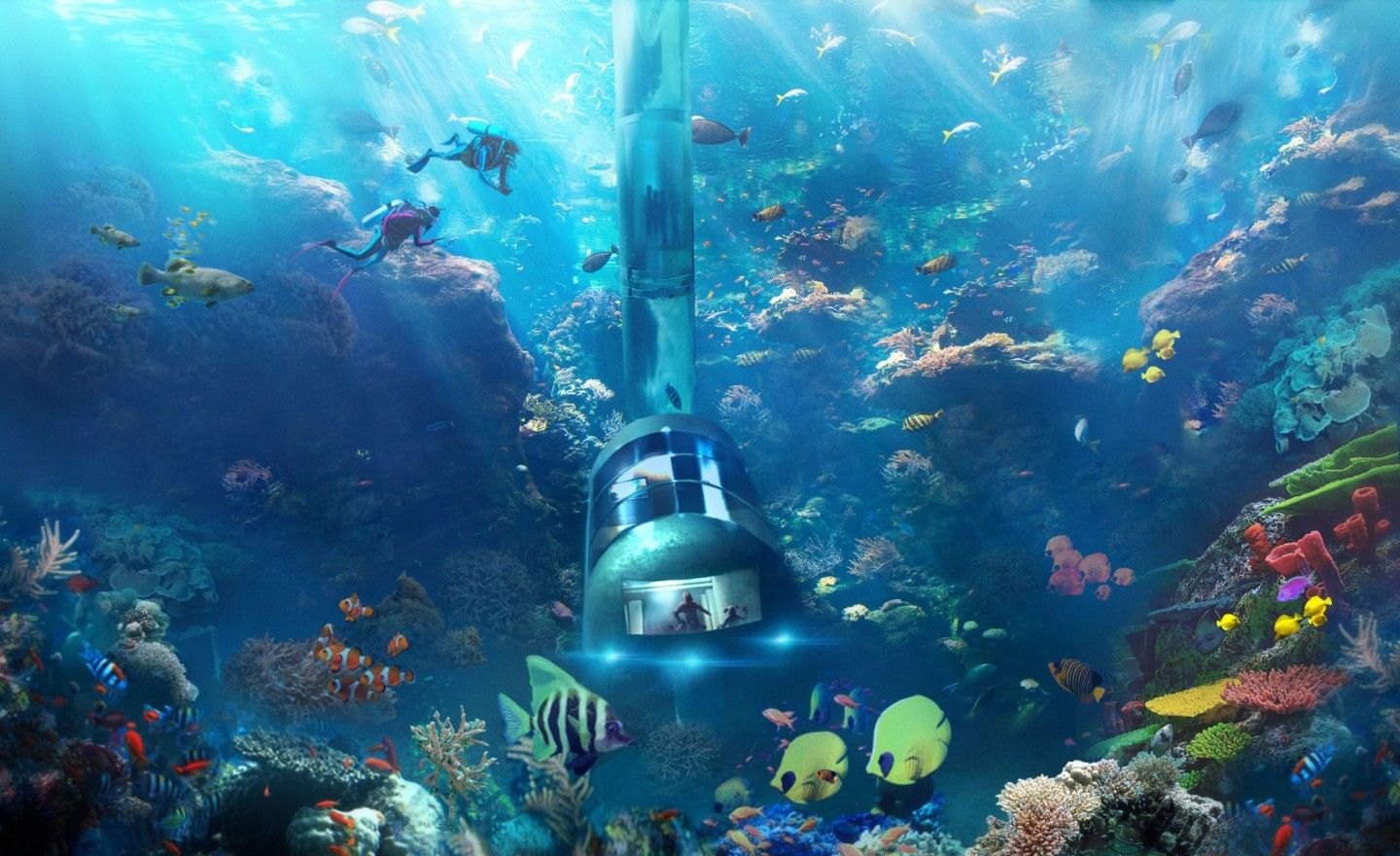
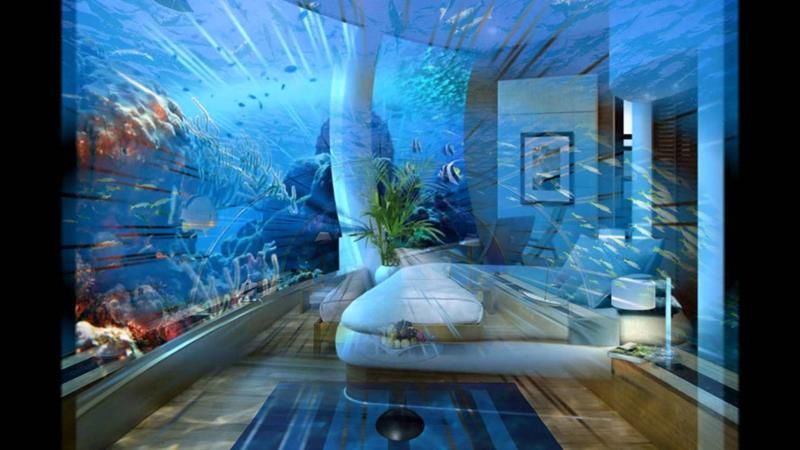
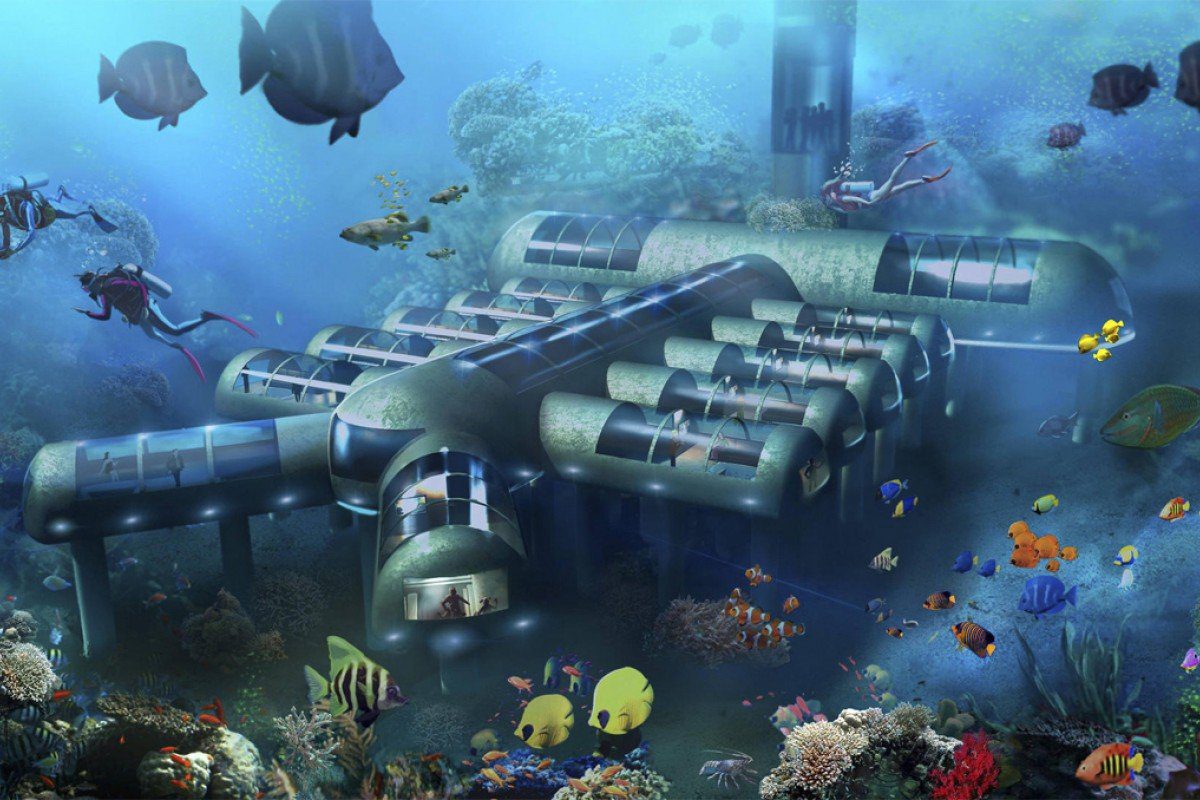
11. Poseidon Undersea Resort, Fiji
Though still in planning phases, Poseidon Undersea Resort promises to be the most ambitious underwater hotel project ever conceived. The resort will feature 24 underwater suites, each with floor-to-ceiling windows providing 270-degree views of the coral reef ecosystem.
The resort plans include underwater wedding chapels, restaurants, and even a library where guests can read while surrounded by marine life.
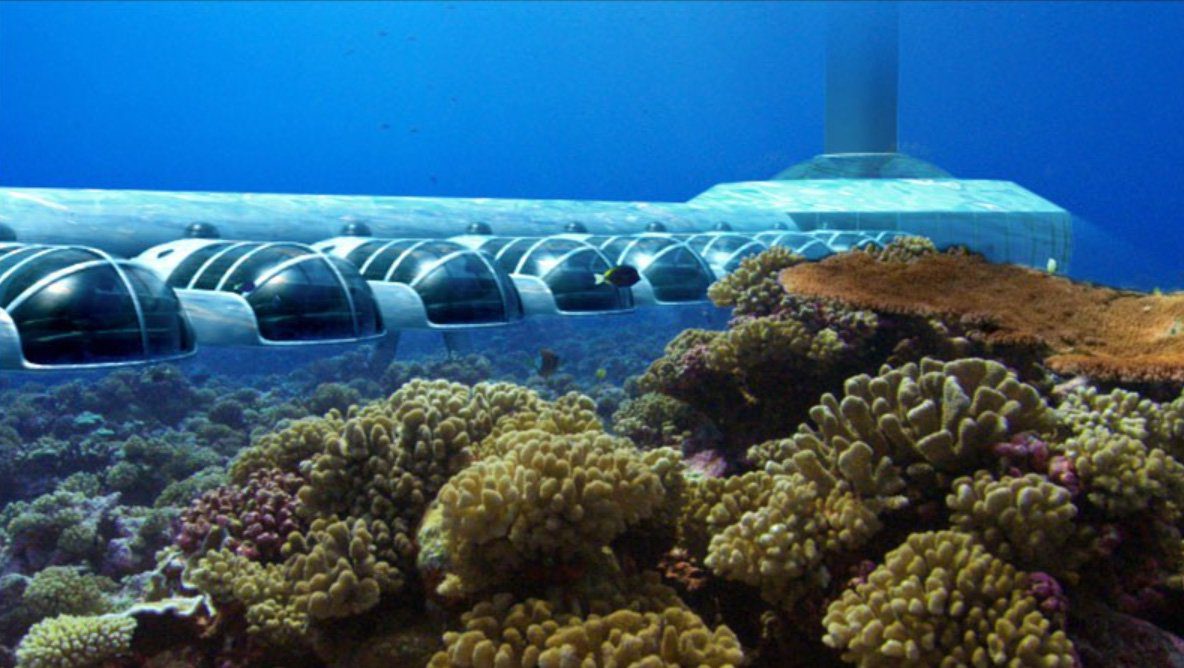
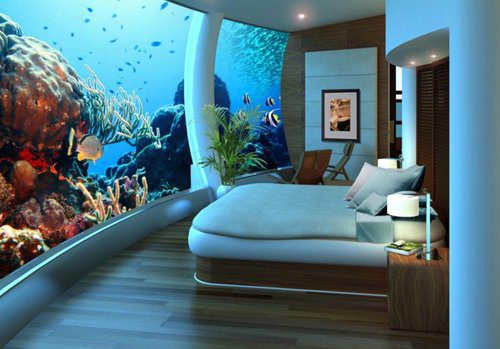
12. The Manta Resort, Pemba Island, Tanzania
The Manta Resort’s Underwater Room floats in a crystal-clear lagoon off Pemba Island. The three-story structure features a bedroom four meters underwater, a lounge at sea level, and a rooftop for stargazing.
What sets this location apart is its pristine coral reef ecosystem. Guests regularly spot octopi, batfish, Spanish dancers, and even the occasional whale shark from their underwater bedroom windows.
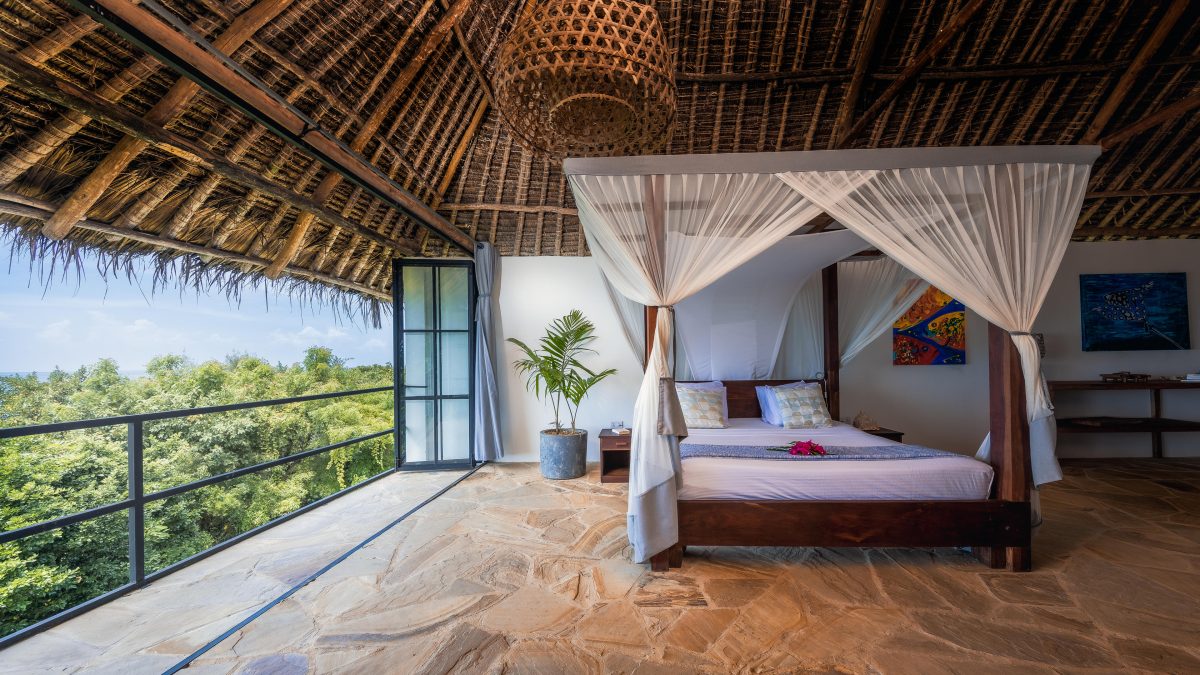
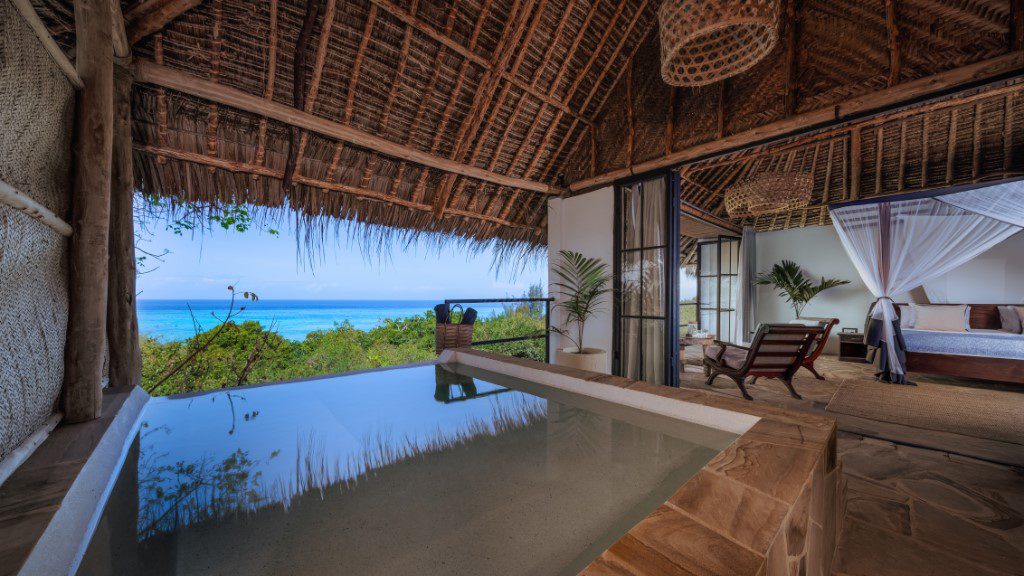
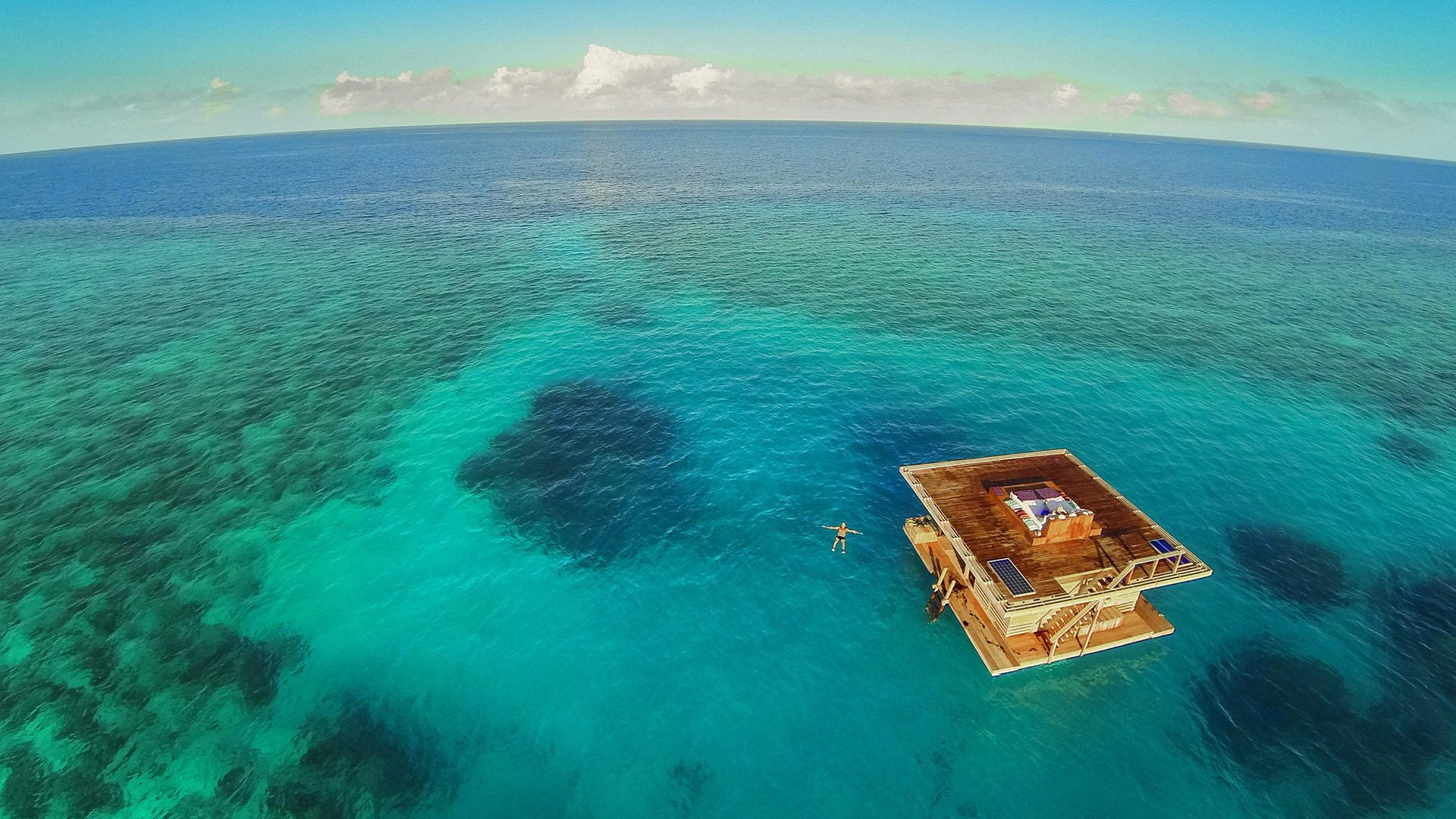
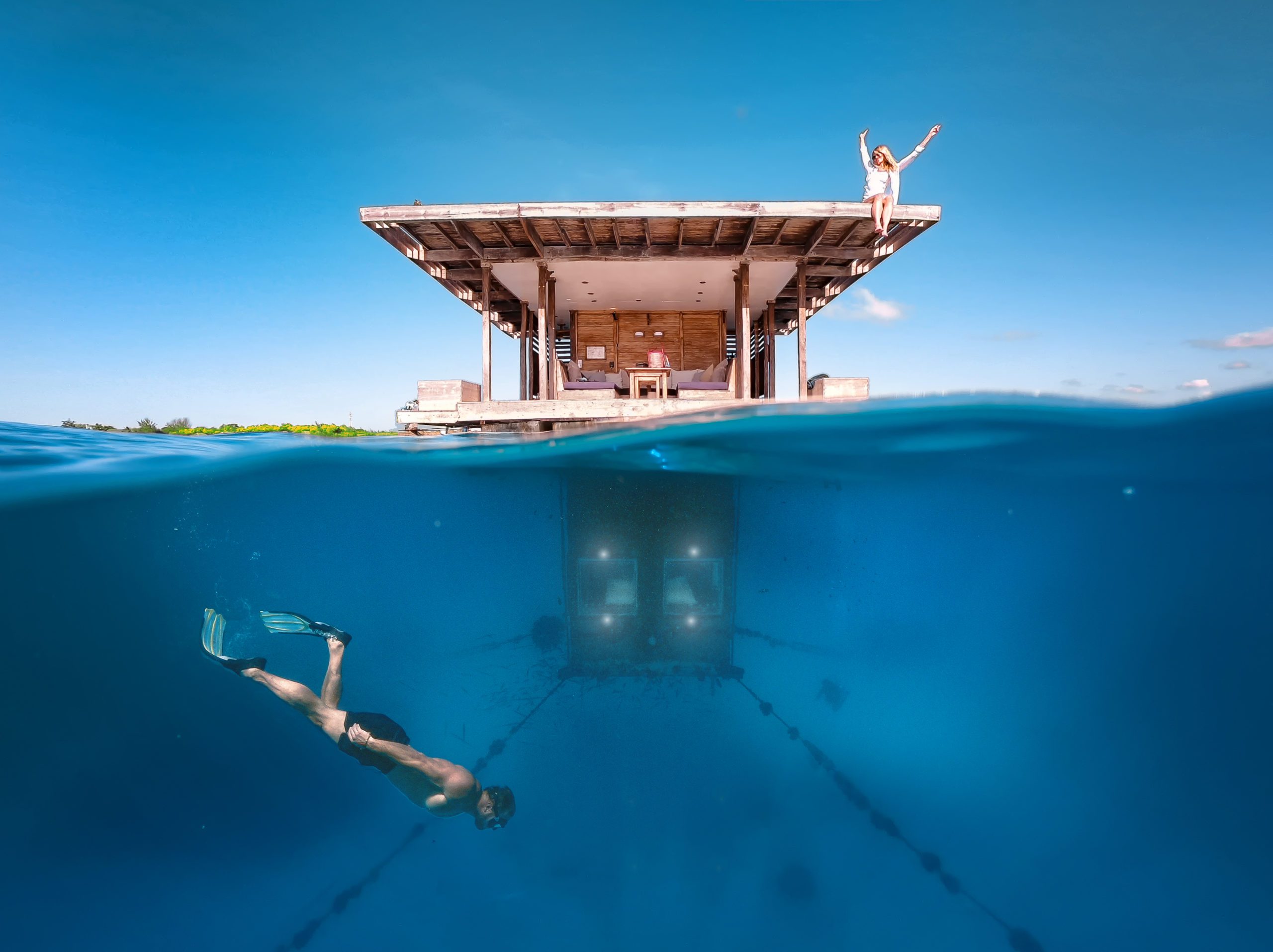
13. Reefsuites at Reefworld, Australia
The newest addition to the underwater hotel scene, Reefsuites offers the world’s first underwater accommodation on the Great Barrier Reef. These pontoon-based suites feature underwater bedrooms with floor-to-ceiling windows facing directly onto the reef.
The two-level suites combine above-water lounging areas with underwater sleeping quarters, creating an intimate connection with one of the world’s most important marine ecosystems.
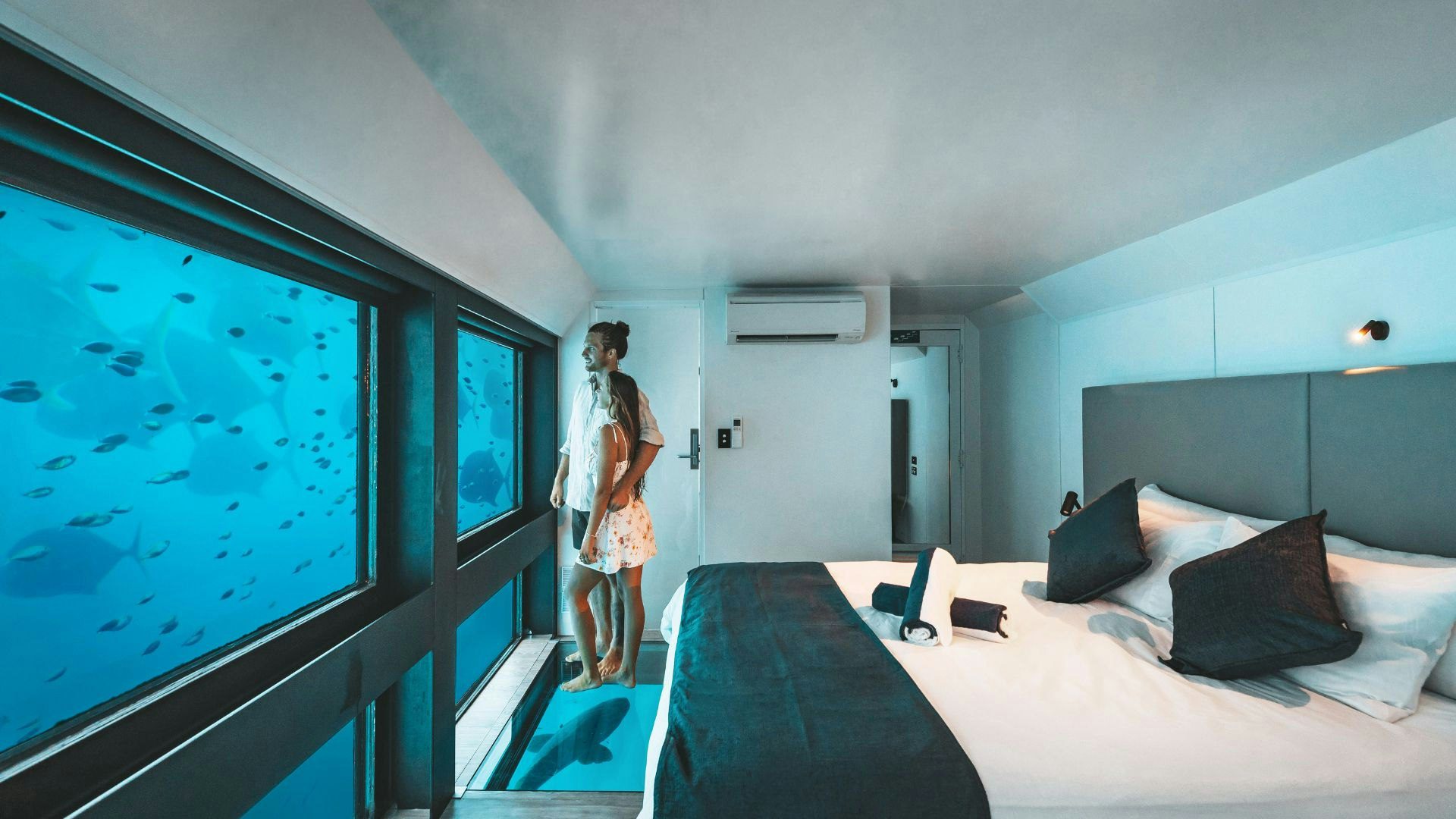
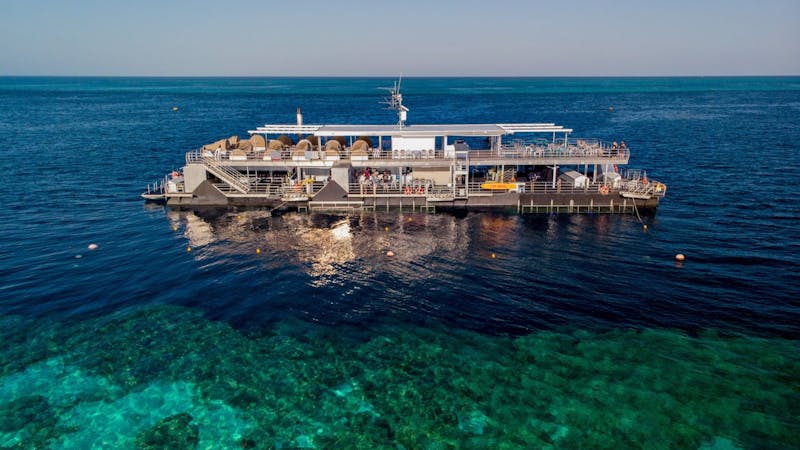
The Sensory Symphony of Underwater Living
Staying in an underwater hotel isn’t just about the visual spectacle—it’s a complete sensory transformation. The gentle rocking motion of water creates a natural lullaby that many guests find more relaxing than any meditation app. The play of light through water creates an ever-changing ceiling of ripples and shadows that shift throughout the day.
The silence is profound yet alive. You’ll hear the subtle sounds of the ocean—the gentle whoosh of currents, the distant calls of marine life, and occasionally the haunting songs of whales. It’s a soundscape that connects you to the ocean’s rhythm in ways that surface hotels simply cannot match.
Temperature control in these environments creates a unique microclimate. The ocean’s natural insulation keeps rooms at comfortable temperatures year-round, while the humidity levels often feel perfect—not too dry, not too moist. It’s as if the ocean itself is regulating your comfort.
The dining experience underwater transcends traditional hospitality. Imagine enjoying fresh seafood while actual fish swim past your table, or sipping champagne while bioluminescent plankton create a natural light show outside your windows. Some underwater restaurants report that guests spend twice as long at their meals simply because they’re mesmerized by the marine theater surrounding them.
Revolutionary Technology and Sustainable Innovation
Technological advancements play a crucial role in the market’s evolution. Innovations in underwater construction, renewable energy systems, and underwater exploration tools enable developers to create more sophisticated and sustainable underwater hotels.
Modern underwater hotels utilize advanced materials like high-strength acrylic that can withstand immense water pressure while maintaining crystal-clear visibility. These acrylic panels, sometimes up to 8 inches thick, are engineered to last decades without clouding or cracking.
Innovation in architectural technology and marine engineering has significantly contributed to the growth of the Underwater Hotels Market. These projects require sophisticated designs to ensure structural integrity, safety, and comfort, often utilizing materials like acrylic and reinforced concrete to withstand underwater pressure.
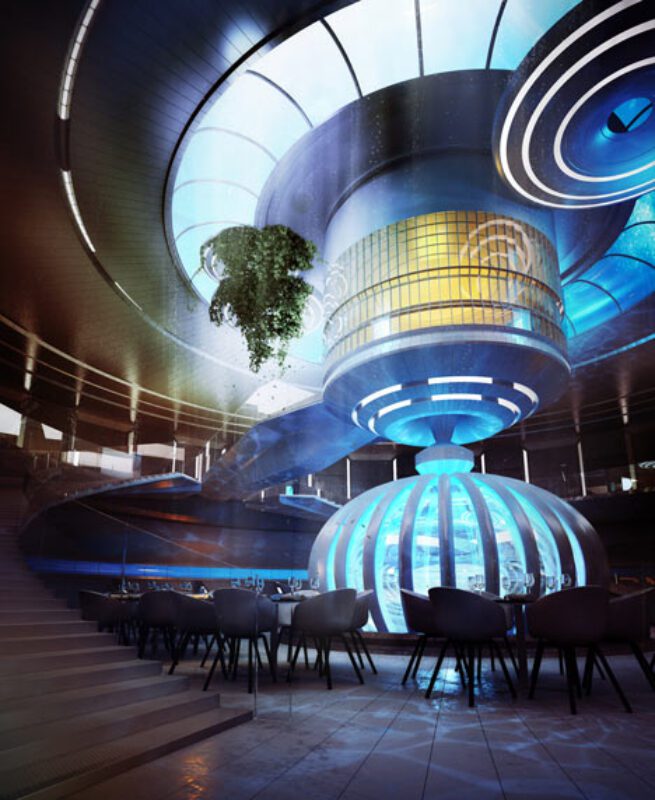
Energy management in underwater environments presents unique challenges and opportunities. Many new projects incorporate renewable energy systems, including underwater current turbines and solar panels on surface structures. The ocean’s consistent temperature also allows for highly efficient geothermal heating and cooling systems.
Air management systems in underwater hotels are marvels of engineering. These facilities maintain perfectly breathable atmospheres while preventing condensation and managing air pressure changes. Advanced filtration systems ensure the air remains fresh and clean, while emergency backup systems provide multiple layers of safety.
Marine Conservation: A Deeper Purpose
Underwater hotels can serve as platforms for marine conservation and education, transforming luxury tourism into environmental stewardship. Many underwater hotels have become unexpected champions of ocean conservation, using their unique positions to educate guests about marine ecosystems while funding critical research.
The presence of underwater hotels often leads to improved marine protection in surrounding areas. Hotel operators have vested interests in maintaining healthy reef ecosystems, as these environments directly impact guest experiences. This has led to private funding for coral restoration projects, marine life research, and water quality monitoring.
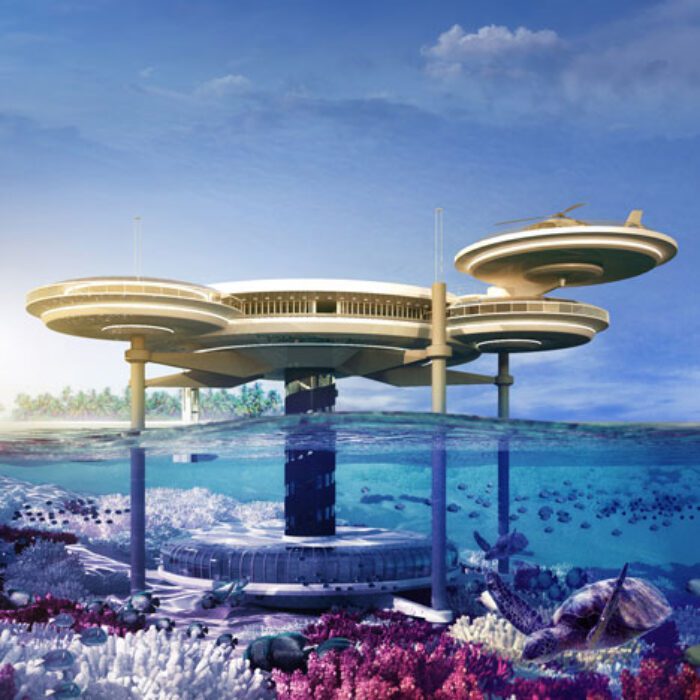
Several underwater hotels employ marine biologists as part of their guest services teams. These experts guide snorkeling and diving excursions while educating visitors about local ecosystems. Guests often leave with a deeper appreciation for ocean conservation, transforming vacation experiences into environmental awareness campaigns.
For instance, Tasmania’s $3.5 million project aims to restore kelp forests, supporting marine biodiversity. Meanwhile, only 8.4% of oceans are in protected zones, according to the 2024 UNEP-WCMC report. This demonstrates a need for greater conservation.
Some underwater hotels contribute directly to scientific research by hosting marine biologists and providing platforms for long-term ecosystem monitoring. The constant human presence allows for detailed observations of marine behavior that would be impossible with traditional research methods.
The Future of Underwater Hospitality
The underwater hotel industry is experiencing unprecedented growth and innovation. According to Brook Park’s development plans in July 2024, construction in Ohio will begin in 2025, supporting local economies and creating jobs. This expansion beyond traditional tropical locations shows how the concept is adapting to different environments and markets.
In 2024, Atoll Estates announced the development of Zamani Islands in South Malé Atoll, Maldives. The project will include the country’s first superyacht marina and yacht club. The first phase, featuring eight islands and three resorts, is expected to launch in spring 2026.
Emerging technologies promise to revolutionize underwater hospitality. Virtual reality integration will allow guests to experience marine life encounters that might not naturally occur during their stay. Artificial intelligence will optimize room positioning based on marine life patterns, ensuring guests have the best possible wildlife viewing opportunities.
Mobile underwater hotels represent the next frontier. These self-contained units can be positioned in different locations based on seasonal marine life patterns, weather conditions, or guest preferences. Imagine staying in the same hotel but experiencing different coral reefs, shipwrecks, or marine sanctuaries throughout your visit.
The integration of submarine tourism with hotel stays is another emerging trend. Guests might spend days exploring deep-sea environments in luxury submarines before returning to their underwater accommodations. This combination of exploration and relaxation could redefine adventure tourism.
Underwater wellness concepts are expanding beyond traditional spas. Future underwater hotels may feature meditation chambers designed to enhance the calming effects of underwater environments, fitness facilities with aquatic views, and even underwater yoga studios where guests can practice surrounded by marine life.
Planning Your Underwater Adventure
The world of underwater hotels offers experiences that challenge our relationship with the ocean and redefine luxury travel. Whether you choose the established elegance of the Muraka, the pioneering spirit of Jules’ Undersea Lodge, or wait for the futuristic concepts currently in development, you’re embarking on a journey that few humans have experienced.
These underwater sanctuaries prove that the ocean isn’t just something to cross or swim in—it’s a destination unto itself. As technology advances and environmental awareness grows, underwater hotels are becoming more sustainable, more accessible, and more extraordinary. They represent humanity’s desire to explore, to experience wonder, and to connect with the natural world in completely new ways.
The ocean covers 71% of our planet’s surface, yet we’ve explored less than 5% of it. Underwater hotels offer a window into this mysterious realm, allowing us to become temporary residents of the deep. In doing so, they don’t just provide luxury accommodations—they expand our understanding of what’s possible when human ingenuity meets oceanic wonder.
The next time you’re planning a getaway, consider going deeper than usual. The ocean is waiting, and it has some incredible rooms available.
The post Sleeping with the Fishes: The Extraordinary World of Underwater Hotels appeared first on Arch2O.com.

